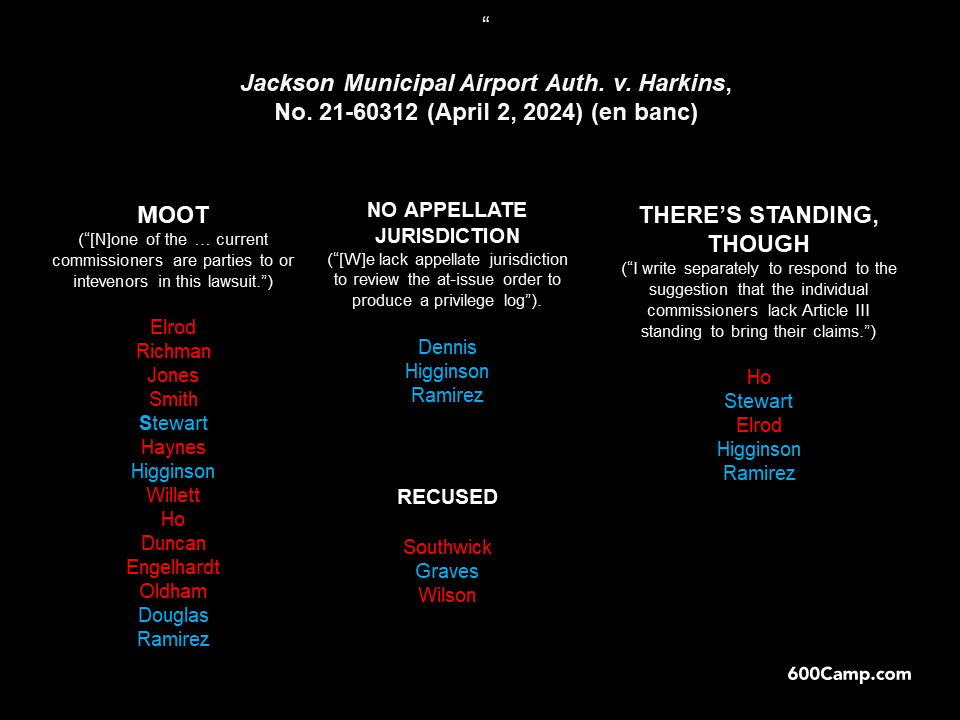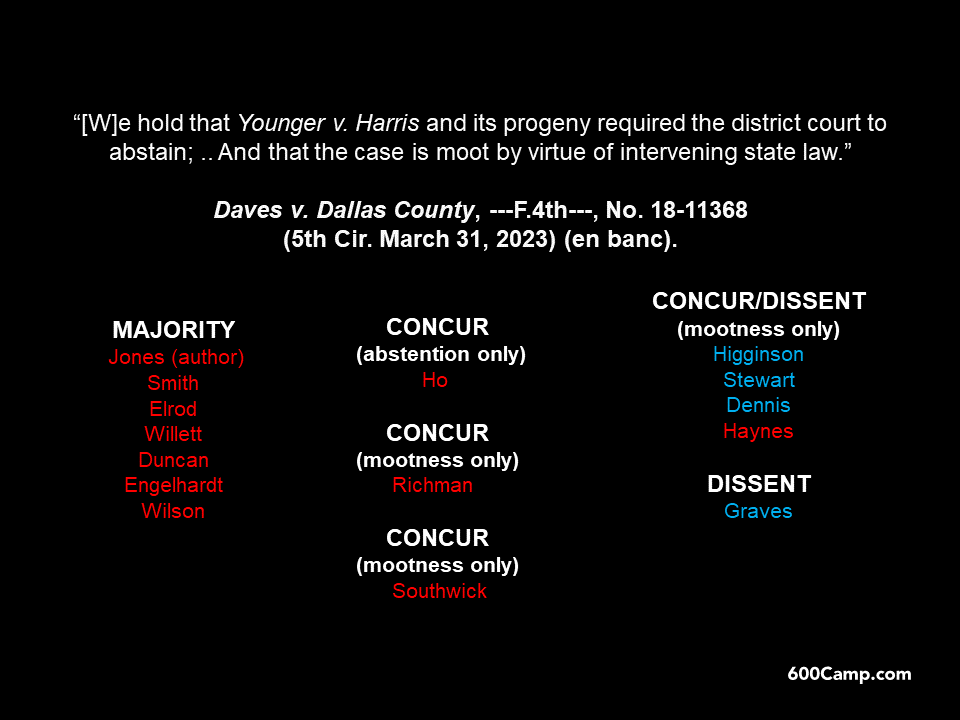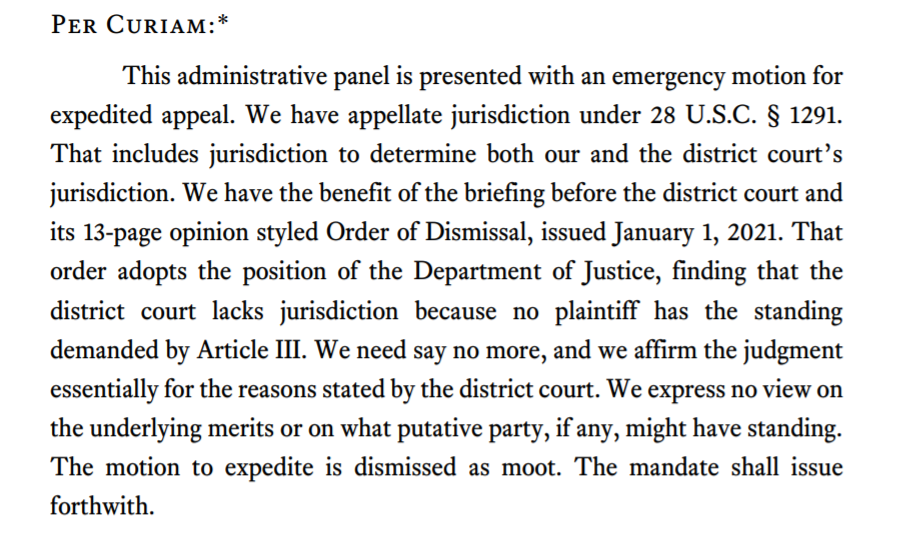After another Supreme Court term featuring reversals of the Fifth Circuit on standing grounds in high-profile cases, I wrote this op-ed in today’s Dallas Morning News about that recurring issue.
Category Archives: Standing / Ripeness / Justiciability
A recent mandamus opinion, In re Sealed Petitioner, made this provocative statement about the potential role of a mandamus writ:
 But of course, “the federal courts established pursuant to Article III of the Constitution do not render advisory opinions ….” E.g., Pub. Workers v. Mitchell, 330 U.S. 75, 89 (1947). Fortunately, review of the cited case shows that it just states principles about mandamus review that are generally accepted as part of today’s standard practice (citations omitted):
But of course, “the federal courts established pursuant to Article III of the Constitution do not render advisory opinions ….” E.g., Pub. Workers v. Mitchell, 330 U.S. 75, 89 (1947). Fortunately, review of the cited case shows that it just states principles about mandamus review that are generally accepted as part of today’s standard practice (citations omitted):
Although the Company correctly observes that mandamus has historically been a drastic remedy generally reserved for really “extraordinary” cases, the federal courts of appeals (as well as the Supreme Court) have shown an increasing willingness in recent years to use the writ as a one-time-only device to “settle new and important problems” that might have otherwise evaded expeditious review. As the District of Columbia Circuit explained … “Schlagenhauf authorizes departure from the final judgment rule when the appellate court is convinced that resolution of an important, undecided issue will forestall future error in trial courts, eliminate uncertainty and add importantly to the efficient administration of justice.”
In  Paxton v. Dettelbach, individual plainitffs challenged a law about firearm silencers, making these statements about their standing:
Paxton v. Dettelbach, individual plainitffs challenged a law about firearm silencers, making these statements about their standing:
I intend to personally manufacture a firearm suppressor for my own non-commercial, personal use. The firearm suppressor will be manufactured in my home from basic materials without the inclusion of any part imported from another state other than a generic and insignificant part, such as a spring, screw, nut, or pin.
The Fifth Circuit found those statements inadequate for two reasons:
- “[T]he declarations do not state any intention to engage in conduct
proscribed by law,” because the federal law at issue was not a blanket prohibition (emphasis added). - “[T]he declarations lack the necessary detail to establish that the Individual Plaintiffs’ professed intent to make a silencer is sufficiently ‘serious’ to render their feared injury ‘imminent’ rather than merely speculative or hypothetical. As the Supreme Court explained in Lujan, at the summary-judgment stage, declarants’ profession of “‘some day’ intentions [to engage in certain conduct]—without any description of concrete plans, or indeed even any specification of when the some day will be—do not support a finding of the ‘actual or imminent’ injury” required for standing.”
And the Court rejected Texas’s claim to standing based on its “quasi-sovereign interests in its citizens’ health and well-being” and “its sovereign interest in the power to create and enforce a legal code.” No. 23-10802 (June 21, 2024).
As I argued a year ago, more than once, the Supreme Court holds 9-0 this morning that the mifepristone plaintiffs lacked standing:
In a counterpoint to some treatments of standing in the mifepristone litigation, the Fifth Circuit rejected Texas’s standing to challenge an SEC disclosure requirement, reasoning:
As the States conceded during oral argument, there is no guarantee that regulated parties will always pass costs on to their consumers. Some costs may be too small to warrant a cost pass-through. So any cost pass-through must be established through evidence. We look to the evidence in the record to determine whether the facts of a specific case support “likely . . . pecuniary harm” to a suing party. Evidence couched in hypothetical language cannot support such an injury. Here, the record provides only speculation about the possibility of increased costs to investors as a result of new regulatory burdens on the funds.
State of Texas v. SEC, No. 23-60079 (May 10, 2024) (citations omitted, paragraph breaks removed, emphasis added).
 Members of the Lipan-Apache Native American Church sued the City of San Antonio about its plans for a large city park that contains an area of particular religious significance to this church. One aspect of the case involved physical access to that area. After the City complied with the trial-court’s order on that issue, the Fifth Circuit held that part of the case was moot, and did not apply the “voluntary cessation” (i.e., “a defendant could … pick up where he left off”) exception to mootness:
Members of the Lipan-Apache Native American Church sued the City of San Antonio about its plans for a large city park that contains an area of particular religious significance to this church. One aspect of the case involved physical access to that area. After the City complied with the trial-court’s order on that issue, the Fifth Circuit held that part of the case was moot, and did not apply the “voluntary cessation” (i.e., “a defendant could … pick up where he left off”) exception to mootness:
[T]he City affirmed that it undertook several additional efforts “going beyond what the district court ordered.” The City conceded that removing the limb allowed it to reconfigure the construction fencing and it subsequently granted public access to the entire area. Likewise, the City granted Appellants access to conduct a religious ceremony at the Sacred Area from midnight to 4 a.m. on November 18, 2023, during hours when the Park is normally closed. Furthermore, on November 21, 2023, the City moved to dismiss its crossappeal in this action, deciding to no longer pursue the issue of access to the Sacred Area. Based on these subsequent developments, “[i]t is therefore clear that [the City officials] harbor no animosity toward [Appellants].” Appellants now have “no reasonable expectation that the wrong challenged by [them] would be repeated.” Thus, the voluntary cessation exception does not apply.
Perez v. City of San Antonio, No. 23-50746 (April 11, 2024) (citations omitted).
In a muscular display of appellate review, in Career Colleges & Schools of Texas v. U.S. Dep’t of Educ., the Fifth Circuit:
- Disagreed with the district court’s conclusion that an association of career schools lacked standing due to a lack of immediate irreparable injury, identifying three types of injury suffered as a result of new DOE regulations about certain defenses to student-loan repayment;
- Concluded that, as a matter of law, the association had satisfied the requirements for a preliminary injunction;
- Gave the resulting injunction nationwide effect; and
- Ordered: “The stay pending appeal remains in effect until the district court enters the preliminary injunction.”
No. 23-50491 (April 4, 2024).
Long-running litigation about control of the Jackson airport led to the en banc court holding on April 2 that the appeal was moot. A breakdown of the viewpoints appears below:
Deanda v. Becerra presents a conflict between Title X (a federal law about the availability of contraception), and a Texas parental-consent statute. The Fifth Circuit found no conflict, and thus no preemption. On the threshold question of standing, the Court rejected the argument that any parent could sue about this issue, observing, inter alia: “This case does not concern all ‘parents or potential parents.’ It concerns only a parent with particular religious beliefs about raising his children.” No. 23-10159 (March 12, 2024).
“Here, ‘all parties have agreed from the beginning of this case that Houston’s voter registration provisions governing circulators’ are unconstitutional. The City also agreed that it ‘would and could not enforce the provisions.’ The City has repeatedly and consistently emphasized its agreement with the plaintiffs throughout this suit. Such faux disputes do not belong in federal court.”
Pool v. City of Houston, No. 22-20491 (Dec. 11, 2023) (citations omitted).
 After resolving threshold matters about justiciability, the Fifth Circuit rejected facial First Amendment challenges to Texas laws about the use of drones in Nat’l Press Photographers Ass’n v. McCraw, as follows:
After resolving threshold matters about justiciability, the Fifth Circuit rejected facial First Amendment challenges to Texas laws about the use of drones in Nat’l Press Photographers Ass’n v. McCraw, as follows:
- “No-Fly” provisions. “Plaintiffs’ First Amendment challenge to the No-Fly provisions falters because ‘only conduct that is “inherently expressive” is entitled to First Amendment protection.’ The operation of a drone is not inherently expressive—nor is it expressive to fly a drone 400 feet over a prison, sports venue, or critical infrastructure facility. And nothing in the No-Fly provisions has anything to do with speech or expression. These are flight restrictions, not speech restrictions.” (footnotes omitted, emphasis in original).
- “Surveillance” provisions (which prohibit the use of a drone to capture images “with the intent to conduct surveillance ….”). “Though most drone operators harbor no harmful intent, drones have singular potential to help individuals invade the privacy rights of others because they are small, silent, and able to capture images from angles and altitudes no ordinary photographer, snoop, or voyeur would be able to reach. … The law is also tailored to bar only surveillance
that could not be achieved through ordinary means …. We therefore conclude that the law survives intermediate scrutiny.”
No. 22-50337 (Oct. 23, 2023). The opinion was later revised.
In Louisiana Fair Housing Action Center, Inc. v. Azalea Garden Properties, LLC, “a nonprofit entity with a mission to eradicate housing discrimination in Louisiana” sued when a “tester” used by that entity experienced allegedly unlawful behavior at an apartment complex.
A Fifth Circuit panel (notably, the same panel that found standing in the high-profile mifepristone case) found that the entity lacked standing, but offered three different analyses of that issue:
- The majority opinion found no cognizable injury had been pleaded, remanding with instructions to dismiss without prejudice;
- A concurrence offered additional thoughts about how cognizable injury could be established on remand (either with new allegations, or by adding individual plaintiffs);
- A dissent saw the standing issue as controlled by a 1982 Supreme Court case about a similarly situated housing nonprofit.
No 22-30609 (Sept. 14, 2023).
I had an op-ed in today’s Dallas Morning News about recent friction between the Supreme Court and Fifth Circuit on standing in some high-profile constitutional/administrative-law cases.
The Satanic Temple–an enthusiastic, if not particularly coherent, litigant–appealed the denial of a preliminary injunction that it sought as to several Texas abortion laws. The Fifth Circuit thoroughly reviewed the principles that govern when a preliminary-injunction appeal can become moot with time, and concluded that they applied here to require dismissal of this particular appeal:
Plaintiffs have already appealed the dismissal of their claims; that appeal is docketed as No. 23-20329. To the extent that plaintiffs want to litigate further any issues that were raised in the preliminary injunction motion and remain live, they may do so in their appeal from the district court’s final judgment.
No. 22-20459 (Aug. 18, 2023) (footnote omitted).
Biology teaches that form follows function; similarly, Crown Castle Fiber v. City of Pasadena teaches that “aesthetic design standards incorporating spacing and undergrounding requirements” cannot flout federal telecommunications law, anymore than a tax on federally-protected commercial activity could.
Specificaly, the Fifth Circuit held that the Federal Telecommunications Act preempted local regulations that effectively prohibited the installation of small cell nodes needed for 5G networks. As for standing, “[e]ven though § 253 does not confer a private right [of action], a plaintiff is not prevented from gaining equitable relief on preemption grounds.” And on the merits, the “spacing and undergrounding” regulations were not reasonable or competitively neutral under the FTA’s safe harbor provision. No. 22-20454 (Aug. 4, 2023).
A&R Engineering sued the Texas Attorney General, complaining about a state law forbidding boycotts of Israel by municipal contractors, and arguing that his enforcement of the law made it lose a valuable contract with the City of Houston. The Fifth Circuit held that A&R lacked standing, concluding:
- Injury in fact. “The lost opportunity is connected to a financial loss. And the loss isn’t speculative. A&R retained records of how much it made in previous contracts ….”
- Traceablity. “The economic harm and lost opportunity are traceable to the City. The City after all is the party responsible for contracting with A&R. But it’s unclear how A&R can trace its economic injury to the Attorney General. Traceability is particularly difficult to show where the proffered chain of causation turns on the government’s speculative future decisions regarding whether and to what extent it will bring enforcement actions in hypothetical cases.”
- Redessability. “[T]he City’s conduct severs any link between A&R’s economic injury and the Attorney General. The City told the district court it would follow state law and include the provision. But the City never attributed its actions to any enforcement or threatened enforcement by the Attorney General. A&R’s injury depended on the ‘unfettered,’ ‘independent’ choices of the City, ‘whose exercise of broad and legitimate discretion [we] cannot presume either to control or to predict,’ so the injury isn’t traceable to the Attorney General.”
A&R Engineering v. Scott, No. 22-20047 (July 10, 2023) (all citations omitted). (The Court’s analysis of redressability echoes Justice Gorsuch’s recent analysis of a similar issue in his concurrence for United States v. Texas, No. 22-58 (U.S. June 23, 2023)).
 In United States v. Texas, last Friday, the Supreme Court reversed a Fifth Circuit judgment because Texas had no standing to bring a particular claim about immigration policy. The case echoes the proceedings in California v. Texas, a 2021 matter in which the Supreme Court also reversed a Fifth Circuit judgment for lack of standing — in that case, an issue about the enforceability of the Affordable Care Act.
In United States v. Texas, last Friday, the Supreme Court reversed a Fifth Circuit judgment because Texas had no standing to bring a particular claim about immigration policy. The case echoes the proceedings in California v. Texas, a 2021 matter in which the Supreme Court also reversed a Fifth Circuit judgment for lack of standing — in that case, an issue about the enforceability of the Affordable Care Act.
As Texas’s Attorney General, Greg Abbott famously quipped: “I go into the office in the morning. I sue Barack Obama, and then I go home.” In a recent interview, I suggest that these opinions are a yellow light for that approach to public-law litigation; Mark Stern makes a similar point in more colorful language for Slate. Time will tell whether that traffic signal is heeded.
In Abdullah v. Paxton, a former state employee sued about potential future injuries, resulting from a state law that requires certain retirement funds to divest from companies that boycott Israel. The Fifth Circuit affirmed the dismissal of his suit on standing grounds, reminding:
The only way Abdullah could demonstrate he will “actually” suffer future economic harm is if he plausibly alleged that, as a result of § 808’s constraints, the Systems will not be able to pay out his benefits at all when he reaches retirement. Abdullah tries his hand at this argument, urging that the Systems are underfunded, so there is a credible threat the fund will fail. But we are unconvinced—this theory is simply too speculative (and also ignores Texas’s ability to obtain funds by taxes, fees, assessments, etc.).
No. 22-50315 (April 11, 2023) (citations omitted).
Longrunning litigation about pretrial bail in Texas criminal cases came to an end with a second en banc opinion, Daves v. Dallas County, No. 18-11368 (March 31, 2023). It held by a substantial majority that legislative changes to the relevant laws had mooted the case, and (8-7) that Younger abstention should have barred the case from proceeding in federal court in the first instance. The breakdown of votes and opinions is as follows:
 The panel majority in Freedom From Religion Foundation v. Mack found no coercion, and thus no standing for the plaintiff, in an Establishment Clause challenge to a Texas Justice of the Peace’s practices regarding a prayer at the beginning of court sessions. No. 21-20279 (Sept. 29, 2022).
The panel majority in Freedom From Religion Foundation v. Mack found no coercion, and thus no standing for the plaintiff, in an Establishment Clause challenge to a Texas Justice of the Peace’s practices regarding a prayer at the beginning of court sessions. No. 21-20279 (Sept. 29, 2022).
This case contrasts with Sambrano v. United States, in which the panel majority found standing in a Title VII case about a company’s vaccination requirement, concluding that the employer’s policies had a coercive effect as to certain employees’ religious beliefs. No. 21-11159 (Feb. 17, 2022, en banc review denied).
 Scylla and Charybdis, the “double threat” foes of Ulysses in the Odyssey (right), would have been interested in Denning v. Bond Pharmacy, Inc., where the plaintiff successfully “show[ed] an injury in fact through her breach of contract claims.” So far so good. But the Court continued: “Athough Denning has established injury in fact, she cannot get past the redressability prong required to establish standing. This is because her injury, as she alleges it, is not redressable by the compensatory and punitive damages that she seeks. Put another way, rendering an award of damages in favor of Denning does not redress her insurer’s injury of being subjected to AIS’s unauthorized billing practices.” No. 21-30534 (Sept. 30, 2022).
Scylla and Charybdis, the “double threat” foes of Ulysses in the Odyssey (right), would have been interested in Denning v. Bond Pharmacy, Inc., where the plaintiff successfully “show[ed] an injury in fact through her breach of contract claims.” So far so good. But the Court continued: “Athough Denning has established injury in fact, she cannot get past the redressability prong required to establish standing. This is because her injury, as she alleges it, is not redressable by the compensatory and punitive damages that she seeks. Put another way, rendering an award of damages in favor of Denning does not redress her insurer’s injury of being subjected to AIS’s unauthorized billing practices.” No. 21-30534 (Sept. 30, 2022).
In the unlikely event that any litigation proceeds under Texas’ SB8 law after Dobbs, a useful reference will be Perez v. McCreary, Veselka, Bragg & Allen, P.C., which found that a plaintiff’s claim under the Fair Debt Collection Act about an inaccurate demand letter failed to satisfy Article III standing requirements:
“’Congress’s creation of a statutory prohibition or obligation and a cause of action does not relieve courts of their responsibility to independently decide whether a plaintiff has suffered a concrete harm under Article III.’ Any other rule would allow Congress to grant private plaintiffs a personal stake in enforcing regulatory law and ultimately usurp the President’s Article II authority to execute the laws. And that would aggrandize our power by letting us resolve disputes that are not ‘of a Judiciary Nature.’
No. 21-50958 (Aug. 15, 2022) (citations omitted) (applying TransUnion LLC v. Ramirez, 141 S. Ct. 2190 (2021)).
 The panel majority in E.T. v. Paxton held that a group of students lacked standing (based on their concerns about catching COVID-19) to challenge Governor Abbott’s order prohibiting school mask mandates, noting:
The panel majority in E.T. v. Paxton held that a group of students lacked standing (based on their concerns about catching COVID-19) to challenge Governor Abbott’s order prohibiting school mask mandates, noting:
“This circuit does not ‘recognize the concept of probabilistic standing based on a non-particularized increased risk—that is, an increased risk that equally affects the general public.’ And even where increased-risk claims are particularized, they generally ‘cannot satisfy the actual or imminent requirement,’ which necessitates ‘evidence of a certainly impending harm or substantial risk of harm.’ That’s because ‘[m]uch government regulation slightly increases a citizen’s risk of injury—or insufficiently decreases the risk compared to what some citizens might prefer.'”
But cf. Sambrano v. United Airlines, No. 21-11159 (Feb. 17, 2022) (unpublished) (finding standing in a COVID vaccine-mandate case when: “Plaintiffs are several United employees who requested religious or medical accommodations from United. Those requesting religious accommodations did so out of concern that aborted fetal tissue was used to develop or test the COVID-19 vaccines.”).
 The long shadow of Edward Young (right), who served as Minnesota’s well-mustachioed Attorney General in the early 20th century, fell upon two companion cases about Texas election laws, in which a panel majority found that the Texas Secretary of State was not a proper defendant under Ex Parte Young. A dissent (from both panel opinions) saw matters otherwise:
The long shadow of Edward Young (right), who served as Minnesota’s well-mustachioed Attorney General in the early 20th century, fell upon two companion cases about Texas election laws, in which a panel majority found that the Texas Secretary of State was not a proper defendant under Ex Parte Young. A dissent (from both panel opinions) saw matters otherwise:
I write to remind failing memories of the signal role of Ex parte Young in directly policing the path of cases and controversies to the Supreme Court from our state and federal courts and warn against its further diminution. … ‘Ex parte Young poses no threat to the Eleventh Amendment or to the fundamental tenets of federalism. To the contrary, it is a powerful implementation of federalism necessary to the Supremacy Clause, a stellar companion to Marbury and Martin v. Hunter’s Lessee.’
…
The majority continues this Court’s effort to shrink the role of Ex parte Young, by overly narrow readings of the state officer’s duty to enforce Texas’s election laws. … [T]he Texas Secretary of State is the “chief election officer of the state” and is directly instructed by statute to “obtain and maintain uniformity in the application, operation, and
interpretation of this code and of the election laws outside this code.” Moreover, the Secretary is charged to “take appropriate action to protect the voting rights of the citizens of this state from abuse by the authorities administering the state’s electoral processes” and “to correct offending conduct.” Although recent decisions by this Court have split hairs regarding the level of enforcement authority required to satisfy Ex parte Young, the Secretary is charged to interpret both the Texas Election Code and the election laws outside the Code, including federal law, to gain uniformity, tasks it is clearly bound to do. The allegation in these cases is that the Secretary is failing in that duty. This charge should satisfy our Ex parte Young inquiry.
TARC v. Scott, No. 20-40643 (March 16, 2022); Richardson v. Flores, No. 20-50744 (March 16, 2022) (footnotes and citations omitted). (I was recently interviewed about the case by KDFW-TV in Dallas.)
A technical setting illustrated a basic requirement for a justiciable claim in Continental Automotive Systems v. Avanci:
“[A]ssuming Continental is contractually entitled to a license on FRAND [‘fair, reasonable, and nondiscriminatory’] terms as a third-party beneficiary, the pleadings reflect that it has suffered no cognizable injury. Put another way, even if Continental has rights under FRAND contracts, the contracts have not been breached because the SEP [‘standard-essential patent’] holders have fulfilled their obligations to the SSOs [“standard-setting organizations”] with respect to Continental. The supplier acknowledges that Avanci and Patent-Holder Defendants are ‘actively licensing the SEPs to the OEMs[,]’ which means that they are making SEP licenses available to Continental on FRAND terms. As it does not need to personally own SEP licenses to operate its business, it has not been denied property to which it was entitled. And absent a ‘denial of property to which a plaintiff is entitled,’ Continental did not suffer an injury in fact. ”
No. 20-11032 (Feb. 28, 2022).
 “Karen does indeed have Article III standing to bring this suit. She seeks money damages to address the death of her son, which was allegedly caused by Defendants’ conduct. So she has sufficiently alleged all three elements required to establish Article III standing at this stage. … The defect here, by contrast, is one of prudential standing. And prudential standing does not present a jurisdictional question, but ‘a merits question: who, according to the governing substantive law, is entitled to enforce the right?’ … And a violation of this rule is a failure of “prudential” standing. ‘[N]ot one
“Karen does indeed have Article III standing to bring this suit. She seeks money damages to address the death of her son, which was allegedly caused by Defendants’ conduct. So she has sufficiently alleged all three elements required to establish Article III standing at this stage. … The defect here, by contrast, is one of prudential standing. And prudential standing does not present a jurisdictional question, but ‘a merits question: who, according to the governing substantive law, is entitled to enforce the right?’ … And a violation of this rule is a failure of “prudential” standing. ‘[N]ot one
[of our precedents] holds that the inquiry is jurisdictional.’ It goes only to the validity of the cause of action. And ‘the absence of a valid … cause of action does not implicate subject-matter jurisdiction.'” Abraugh v. Altimus, No. 21-30205 (Feb. 14, 2022) (citations omitted) (emphasis added, citations omitted).
 Walmart sued the U.S. government, seeking declaratory judgments on several issues about the enforcement of laws related to opioids. In the meantime, the the US brought an enforcement action against Walmart in Delaware. The panel in Walmart, Inc. v. U.S. Dep’t of Justice concluded that the Delaware action made this declaratory-judgment case unnecessary; two judges also concluded that Wal-Mart had not identified a specific type of action or decision as to which the United States had waived sovereign immunity in the Administrative Procedure Act. No. 21-40157 (Dec. 22, 2021).
Walmart sued the U.S. government, seeking declaratory judgments on several issues about the enforcement of laws related to opioids. In the meantime, the the US brought an enforcement action against Walmart in Delaware. The panel in Walmart, Inc. v. U.S. Dep’t of Justice concluded that the Delaware action made this declaratory-judgment case unnecessary; two judges also concluded that Wal-Mart had not identified a specific type of action or decision as to which the United States had waived sovereign immunity in the Administrative Procedure Act. No. 21-40157 (Dec. 22, 2021).
 A frequent international traveler alleged that he had been placed on a TSA list that required additional, invasive searches of him when he flew. The Fifth Circuit affirmed the dismissal of the several Constitutional claims that he raised in a lawsuit against the leaders of the relevant federal agencies:
A frequent international traveler alleged that he had been placed on a TSA list that required additional, invasive searches of him when he flew. The Fifth Circuit affirmed the dismissal of the several Constitutional claims that he raised in a lawsuit against the leaders of the relevant federal agencies:
“In short, Ghedi has no right to hassle-free travel. In the Supreme Court’s view, international travel is a ‘freedom’ subject to ‘reasonable governmental regulation.’ And when it comes to reasonable governmental regulation, our sister circuits have held that Government-caused inconveniences during international travel do not deprive a traveler’s right to travel. In the Sixth Circuit’s view, ‘incidental or negligible’ delays of ‘ten minutes’ to ‘an entire day’ do not ‘implicate the right to travel.’ The Second and Tenth Circuits have held the same. Ghedi has therefore failed to plausibly allege that he has been deprived of his right to travel internationally by the extra security measures he has experienced.”
Ghedi v. Mayorkas, No. 20-10995 (Oct. 25, 2021) (footnotes omitted).
The Fifth Circuit denied the stay application in the appeal of the DOJ’s lawsuit against SB8, stating: While the referenced Fifth Circuit opinion primarily focused on Ex Parte Young (not relevant in a suit by the US, see West Virginia v. United States, 479 U.S. 305 (1987)), it made other observations about justiciability that this order suggests will now be central in the resolution of the merits. Professor Steve Vladeck further analyzes the relationship of the two cases in a recent Twitter thread.
While the referenced Fifth Circuit opinion primarily focused on Ex Parte Young (not relevant in a suit by the US, see West Virginia v. United States, 479 U.S. 305 (1987)), it made other observations about justiciability that this order suggests will now be central in the resolution of the merits. Professor Steve Vladeck further analyzes the relationship of the two cases in a recent Twitter thread.
 The United States successfully seized the M/Y Galactic Star, a valuable yacht, in connection with a massive bribery scheme involving Nigerian government officials. The Fifth Circuit agreed with the district court that the majority shareholder of the yacht’s corporate owner lacked standing to complain: “LightRay chose to maintain Earnshaw as a separate corporate entity, thereby securing all the attendant advantages of doing so, including an attempt by its principals to support the argument that LightRay is an innocent owner. We agree with the Eighth Circuit that ‘[a] court of equity will not disregard a corporation’s exclusive ownership of assets and claims ‘where those in control have deliberately adopted the corporate form in order to secure its advantages.’'” United States v. The M/Y Galactic Star, No. 20-20471 (Sept. 13, 2021) (citations omitted).
The United States successfully seized the M/Y Galactic Star, a valuable yacht, in connection with a massive bribery scheme involving Nigerian government officials. The Fifth Circuit agreed with the district court that the majority shareholder of the yacht’s corporate owner lacked standing to complain: “LightRay chose to maintain Earnshaw as a separate corporate entity, thereby securing all the attendant advantages of doing so, including an attempt by its principals to support the argument that LightRay is an innocent owner. We agree with the Eighth Circuit that ‘[a] court of equity will not disregard a corporation’s exclusive ownership of assets and claims ‘where those in control have deliberately adopted the corporate form in order to secure its advantages.’'” United States v. The M/Y Galactic Star, No. 20-20471 (Sept. 13, 2021) (citations omitted).
 A chapter of the United Daughters of the Confederacy complained about the recent removal of a statue of a Confederate soldier from a San Antonio park. The Fifth Circuit affirmed the dismissal of its claim, observing (1) an 1899 document relating to the construction of the statue did not create a conveyance or use privilege for the relevant land; and (2) if it had done so, any such conveyance expired when an earlier chapter that actually received the document ceased operations in 1972, without conveying any such interest to its successor. Albert Sidney Johnston Chapter, Chapter No. 2060, UDC v. City of San Antonio, No. 20-50155 (Aug. 25, 2021).
A chapter of the United Daughters of the Confederacy complained about the recent removal of a statue of a Confederate soldier from a San Antonio park. The Fifth Circuit affirmed the dismissal of its claim, observing (1) an 1899 document relating to the construction of the statue did not create a conveyance or use privilege for the relevant land; and (2) if it had done so, any such conveyance expired when an earlier chapter that actually received the document ceased operations in 1972, without conveying any such interest to its successor. Albert Sidney Johnston Chapter, Chapter No. 2060, UDC v. City of San Antonio, No. 20-50155 (Aug. 25, 2021).
 “‘Lost debt’ cases present a unique type of claim. They allege ‘a RICO violation whose central purpose [i]s to prevent the collection of a claim or judgment.’ The substantive RICO violation is the act of preventing collection. And the plaintiff’s injury is the inability to collect the lawful debt. So, when the plaintiff successfully recovers that debt, it is no longer lost. And because that unrecovered debt is the only source of the plaintiff’s injury, there is no RICO claim in its absence. As a result, a plaintiff cannot rely on its lost debt to animate a RICO suit after it has recovered that debt. The ‘debt is “lost” and thereby
“‘Lost debt’ cases present a unique type of claim. They allege ‘a RICO violation whose central purpose [i]s to prevent the collection of a claim or judgment.’ The substantive RICO violation is the act of preventing collection. And the plaintiff’s injury is the inability to collect the lawful debt. So, when the plaintiff successfully recovers that debt, it is no longer lost. And because that unrecovered debt is the only source of the plaintiff’s injury, there is no RICO claim in its absence. As a result, a plaintiff cannot rely on its lost debt to animate a RICO suit after it has recovered that debt. The ‘debt is “lost” and thereby
becomes a basis for RICO trebling only if the debt (1) cannot be collected (2)
“by reason of” a RICO violation.’ ‘In other words, to the extent of a successful collection, the RICO claim is abated pro tanto, prior to any application of trebling.'” HCB Fin. Corp. v. McPherson, No. 20-50718 (Aug. 4, 2021) (citations omitted). Put another way: “There must be independent damages to treble; the possibility of treble damages alone cannot confer statutory RICO standing.”
 The Fifth Circuit rejected class claims about the handling of funds in an ERISA plan, identifying a basic standing problem arising from the links in the causal chain of the plaintiffs’ damages theory: “[Plaintiffs’] expert has provided calculations for the returns that they would have earned had they not invested in the FCU Option but had instead placed their money in a stable value fund. This ‘lost investment income’ is a ‘concrete’ and redressable injury for the purposes of standing. That said, another question we must ask is whether Plaintiffs would have in fact invested in a stable value fund to earn the higher returns had [Defendants] never offered the FCU Option. In other words, the question is whether Plaintiffs have demonstrated that it is ‘substantially probable that the challenged acts of the defendant, not of some . . . third party[]’ (including themselves) caused the injury. If anything, the record reveals that Plaintiffs would not have invested in a stable value fund in a counterfactual world since they did not place their money in one when given the opportunity to do so.” (citations omitted, emphasis added). Oritz v. American Airlines, No. 20-10817 (July 19, 2021).
The Fifth Circuit rejected class claims about the handling of funds in an ERISA plan, identifying a basic standing problem arising from the links in the causal chain of the plaintiffs’ damages theory: “[Plaintiffs’] expert has provided calculations for the returns that they would have earned had they not invested in the FCU Option but had instead placed their money in a stable value fund. This ‘lost investment income’ is a ‘concrete’ and redressable injury for the purposes of standing. That said, another question we must ask is whether Plaintiffs would have in fact invested in a stable value fund to earn the higher returns had [Defendants] never offered the FCU Option. In other words, the question is whether Plaintiffs have demonstrated that it is ‘substantially probable that the challenged acts of the defendant, not of some . . . third party[]’ (including themselves) caused the injury. If anything, the record reveals that Plaintiffs would not have invested in a stable value fund in a counterfactual world since they did not place their money in one when given the opportunity to do so.” (citations omitted, emphasis added). Oritz v. American Airlines, No. 20-10817 (July 19, 2021).
A wheelchair-bound potential juror complained about the inaccessibility of the courthouse to him when he was called for jury duty. The Fifth Circuit reviewed two guideposts about standing for such claims in its earlier opinions, noting:
O’Hair and Herman can be summarized as holding that a plaintiff with a substantial risk of being called for jury duty has standing to seek an injunction against a systemic exclusionary practice but not a one-off, episodic exclusion related to a particular judge’s actions. Thus, the plaintiff in O’Hair had standing for injunctive relief against a state constitutional provision that systemically excluded atheists from jury service, but the plaintiff in Herman lacked standing for injunctive relief against a particular judge’s conduct.
Applied to this case, the Fifth Circuit held: “[Plaintiff] has a substantial risk of being called for jury duty again. He was called twice between 2012 and 2017. Those past incidents, though insufficient to confer standing, are still ‘evidence bearing on whether there is a real and immediate threat of repeated injury.’ Moreover, Hinds County is not extremely populous, and only a subset of its population is eligible for jury service, so it’s fairly likely that Crawford will again, at some point, be called for jury duty.” Crawford v. Hinds County Board of Supervisors, No. 20-60372 (June 16, 2021) (citations omitted).
 DM Arbor Court v. City of Houston explains that a case may become ripe during the course of the appeal process: “Although some of the ripeness-on-appeal caselaw is couched in the language of discretion, our best reading of the decisions—especially those from the Supreme Court—is that ‘[i]ntervening events that occur after decision in lower courts should be included’ when an appellate court assesses ripeness. Supporting this view is the City’s inability to cite any case in which an appellate court declined to find a dispute ripe when postjudgment events had made it so. And we have an obligation to exercise the jurisdiction Article III and Congress grant us when any impediments, such as prudential concerns, have been eliminated. Cf.Colo. River Water Conservation Dist. v. United States, 424 U.S. 800, 813, 817 (1976) (recognizing that abstention ‘is an extraordinary and narrow exception’ to the ‘virtually unflagging obligation of the federal courts to exercise the jurisdiction given them’).” No. 20-20194 (Feb. 12, 2021) (other citations omitted).
DM Arbor Court v. City of Houston explains that a case may become ripe during the course of the appeal process: “Although some of the ripeness-on-appeal caselaw is couched in the language of discretion, our best reading of the decisions—especially those from the Supreme Court—is that ‘[i]ntervening events that occur after decision in lower courts should be included’ when an appellate court assesses ripeness. Supporting this view is the City’s inability to cite any case in which an appellate court declined to find a dispute ripe when postjudgment events had made it so. And we have an obligation to exercise the jurisdiction Article III and Congress grant us when any impediments, such as prudential concerns, have been eliminated. Cf.Colo. River Water Conservation Dist. v. United States, 424 U.S. 800, 813, 817 (1976) (recognizing that abstention ‘is an extraordinary and narrow exception’ to the ‘virtually unflagging obligation of the federal courts to exercise the jurisdiction given them’).” No. 20-20194 (Feb. 12, 2021) (other citations omitted).
 The Twelfth Amendment says: “The President of the Senate shall, in the presence of the Senate and House of Representatives, open all the certificates and the votes shall then be counted.” By statute, that is to occur this year on January 6. That statute also lays out a procedure for handling objections to votes. Judge Jeremy Kernodle of Tyler rejected a challenge to that process, as the process is in detailed in Section 15 of 1887’s Electoral Count Act, stating: “Plaintiff Louie Gohmert, the United States Representative for Texas’s First Congressional District, alleges at most an institutional injury to the House of Representatives. Under well settled Supreme Court authority, that is insufficient to support standing.” Gohmert v. Pence, No. 6:20-cv-660-JDK (E.D. Tex. Jan. 1, 2020).
The Twelfth Amendment says: “The President of the Senate shall, in the presence of the Senate and House of Representatives, open all the certificates and the votes shall then be counted.” By statute, that is to occur this year on January 6. That statute also lays out a procedure for handling objections to votes. Judge Jeremy Kernodle of Tyler rejected a challenge to that process, as the process is in detailed in Section 15 of 1887’s Electoral Count Act, stating: “Plaintiff Louie Gohmert, the United States Representative for Texas’s First Congressional District, alleges at most an institutional injury to the House of Representatives. Under well settled Supreme Court authority, that is insufficient to support standing.” Gohmert v. Pence, No. 6:20-cv-660-JDK (E.D. Tex. Jan. 1, 2020).
A Fifth Circuit motions panel (Higginbotham, Smith, Oldham) dismissed an effort at immediate appeal:
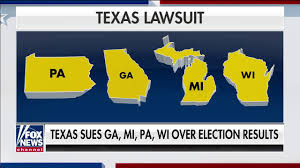 The Supreme Court’s rejection of Texas v. Pennsylvania (despite support from an amicus brief by two nonexistent states) has sparked an unusual national dialogue about the concept of standing (including the President’s accurate observation: “All they were interested in is ‘standing’, which makes it very difficult for the President to present a case on the merits.” (emphasis added)). The capable Rory Ryan at Baylor Law School has analyzed and critiqued the dissenters’ position; for reference, the entire order appears below:
The Supreme Court’s rejection of Texas v. Pennsylvania (despite support from an amicus brief by two nonexistent states) has sparked an unusual national dialogue about the concept of standing (including the President’s accurate observation: “All they were interested in is ‘standing’, which makes it very difficult for the President to present a case on the merits.” (emphasis added)). The capable Rory Ryan at Baylor Law School has analyzed and critiqued the dissenters’ position; for reference, the entire order appears below:
The State of Texas’s motion for leave to file a bill of complaint is denied for lack of standing under Article III of the Constitution. Texas has not demonstrated a judicially cognizable interest in the manner in which another State conducts its elections. All other pending motions are dismissed as moot. Statement of Justice Alito, with whom Justice Thomas joins: In my view, we do not have discretion to deny the filing of a bill of complaint in a case that falls within our original jurisdiction. See Arizona v. California, 589 U. S. ___ (Feb. 24, 2020) (Thomas, J., dissenting). I would therefore grant the motion to file the bill of complaint but would not grant other relief, and I express no view on any other issue.
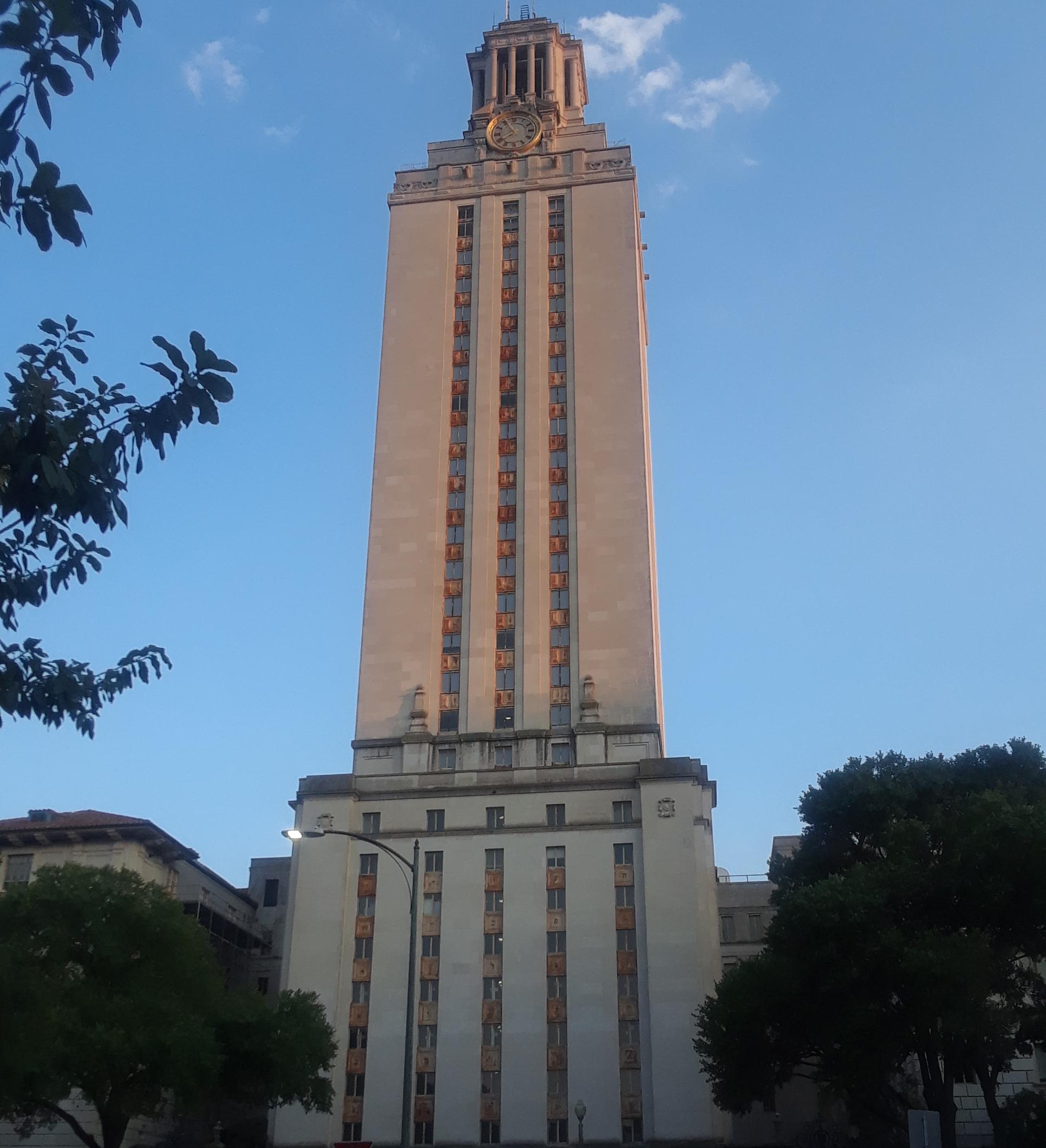 The University of Texas’s rules about campus speech did not fare well in Speech First, Inc. v. Fenves, in which the Fifth Circuit found that a preliminary-injunction action could proceed. The Court found that the case was not moot and stated a strong claim on the merits: “Of course, not every utterance is worth protecting under the First Amendment. In our current national condition, however, in which ‘institutional leaders, in a spirit of panicked damage control, are delivering hasty and disproportionate punishment instead of considered reforms,’ courts must be especially vigilant against assaults on speech in the Constitution’s care. Otherwise, the people may not be free to generate, debate, and discuss both general and specific ideas, hopes, and experiences,’ to ‘transmit their resulting views and conclusions to their elected representatives,’ ‘to influence the public policy enacted by elected representatives,’ and thereby to realize the political and human common good.” No. 19-50529 (revised Oct. 30, 2020) (footnotes omitted).
The University of Texas’s rules about campus speech did not fare well in Speech First, Inc. v. Fenves, in which the Fifth Circuit found that a preliminary-injunction action could proceed. The Court found that the case was not moot and stated a strong claim on the merits: “Of course, not every utterance is worth protecting under the First Amendment. In our current national condition, however, in which ‘institutional leaders, in a spirit of panicked damage control, are delivering hasty and disproportionate punishment instead of considered reforms,’ courts must be especially vigilant against assaults on speech in the Constitution’s care. Otherwise, the people may not be free to generate, debate, and discuss both general and specific ideas, hopes, and experiences,’ to ‘transmit their resulting views and conclusions to their elected representatives,’ ‘to influence the public policy enacted by elected representatives,’ and thereby to realize the political and human common good.” No. 19-50529 (revised Oct. 30, 2020) (footnotes omitted).
 Belcher complained about the FDIC’s power to take his deposition. The parties, and the panel majority, agreed that his lawsuit did not become moot even after the challenged deposition occurred: ‘Because the district court on remand can ‘fashion some form of meaningful relief,’ appeal is not moot. Exactly what that relief might entail is beyond the scope of our concern. However, it is undisputed by the parties that the district court could strike Belcher’s deposition testimony before the FDIC.” The majority also noted that the district court could address the FDIC’s sharing of the transcript. A dissent observed: “I see no reason to override what common sense suggests: the appeal of an order requiring a deposition is moot once the deposition is over.” FDIC v. Belcher, No. 19-31023 (Oct. 26, 2020).
Belcher complained about the FDIC’s power to take his deposition. The parties, and the panel majority, agreed that his lawsuit did not become moot even after the challenged deposition occurred: ‘Because the district court on remand can ‘fashion some form of meaningful relief,’ appeal is not moot. Exactly what that relief might entail is beyond the scope of our concern. However, it is undisputed by the parties that the district court could strike Belcher’s deposition testimony before the FDIC.” The majority also noted that the district court could address the FDIC’s sharing of the transcript. A dissent observed: “I see no reason to override what common sense suggests: the appeal of an order requiring a deposition is moot once the deposition is over.” FDIC v. Belcher, No. 19-31023 (Oct. 26, 2020).
 In one of many recent election-law disputes, the panel majority in Richardson v. Hughs painstakingly reviewed, and rejected, the plaintiffs’ challenge to Texas’s practices about signature verification for mail-in ballots. The procedural posture was a motion to stay; a concurrence cauti
In one of many recent election-law disputes, the panel majority in Richardson v. Hughs painstakingly reviewed, and rejected, the plaintiffs’ challenge to Texas’s practices about signature verification for mail-in ballots. The procedural posture was a motion to stay; a concurrence cauti oned: “[T]he reality is that the ultimate legality of the present system cannot be settled by the federal courts at this juncture when voting is already underway, and any opinion on a motions panel is essentially written in sand with no precedential value ….” footnote omitted). No. 20-50774 (Oct. 20, 2020).
oned: “[T]he reality is that the ultimate legality of the present system cannot be settled by the federal courts at this juncture when voting is already underway, and any opinion on a motions panel is essentially written in sand with no precedential value ….” footnote omitted). No. 20-50774 (Oct. 20, 2020).
If the law had an attic, it would hold the subject matter of Pool v. City of Houston, No. 19-20828 (Oct. 23, 2020):

It is often said that courts “strike down” laws when ruling them unconstitutional. That’s not quite right. Courts hold laws unenforceable; they do not erase them. Many laws that are plainly unconstitutional remain on the statute books. Jim Crow-era segregation laws are one example. The City of Houston contends that it’s being sued for one of these so-called “zombie” laws. Its Charter allows only registered voters to circulate petitions for initiatives and referenda, even though the Supreme Court held a similar law unconstitutional twenty years ago. This case thus requires us to decide when the threat of continued enforcement is enough to reanimate a zombie law and bring it from the statutory graveyard into federal court.
 (citations omitted). Held: the zombie walked, based both on the City’s history of enforcement of this specific law, and the inadequacy of its effort to disclaim further enforcement: “At least based on the current record, the City’s addition of the ‘Editor’s note’ on its website does not moot this case. Voluntarily stopping an unconstitutional practice renders a case moot only ‘if subsequent events ma[k]e it absolutely clear that the allegedly wrongful behavior c[an] not reasonably be expected to recur.'” You can hear more about this case on the Coale Mind Halloween Special – “Attack of the Zombie Statute!”
(citations omitted). Held: the zombie walked, based both on the City’s history of enforcement of this specific law, and the inadequacy of its effort to disclaim further enforcement: “At least based on the current record, the City’s addition of the ‘Editor’s note’ on its website does not moot this case. Voluntarily stopping an unconstitutional practice renders a case moot only ‘if subsequent events ma[k]e it absolutely clear that the allegedly wrongful behavior c[an] not reasonably be expected to recur.'” You can hear more about this case on the Coale Mind Halloween Special – “Attack of the Zombie Statute!”
 John Dierlam doggedly pursued his religious-freedom challenge to the Affordable Care Act throughout that statute’s “serpentine history.” After considering his persistence in the face of constant statutory change, the Fifth Circuit reversed a finding of mootness, observing: “Ordinarily, when a case ‘has become moot on appeal,’ the court
John Dierlam doggedly pursued his religious-freedom challenge to the Affordable Care Act throughout that statute’s “serpentine history.” After considering his persistence in the face of constant statutory change, the Fifth Circuit reversed a finding of mootness, observing: “Ordinarily, when a case ‘has become moot on appeal,’ the court  should “vacate the judgment with directions to dismiss.” But ‘in instances where the mootness is attributable to a change in the legal framework governing the case, and where the plaintiff may have some residual claim under the new framework that was understandably not asserted previously,’ we ‘vacate the judgment and remand for further proceedings in which the parties may, if necessary, amend their pleadings or develop the record more fully.’” Dierlam v. Trump, No. 18-20440 (Oct. 15, 2020).
should “vacate the judgment with directions to dismiss.” But ‘in instances where the mootness is attributable to a change in the legal framework governing the case, and where the plaintiff may have some residual claim under the new framework that was understandably not asserted previously,’ we ‘vacate the judgment and remand for further proceedings in which the parties may, if necessary, amend their pleadings or develop the record more fully.’” Dierlam v. Trump, No. 18-20440 (Oct. 15, 2020).
 The most recent episode of the Coale Mind podcast discusses Mi Familia Vota v. Abbott, No. 20-50793 (Oct. 14, 2020), a challenge to several Texas voting laws in light of the COVID-19 pandemic. The case reminds of two important limits on federal judicial power in such disputes:
The most recent episode of the Coale Mind podcast discusses Mi Familia Vota v. Abbott, No. 20-50793 (Oct. 14, 2020), a challenge to several Texas voting laws in light of the COVID-19 pandemic. The case reminds of two important limits on federal judicial power in such disputes:
- Under Ex parte Young (Mr. Young appears to the right): “Although a court can enjoin state officials from enforcing statutes, such an injunction must be directed to those who have the authority to enforce those statutes. In the present case, that would be county or other local officials.”
- And naming the right defendant is only the first hurdle posed by federalism: “An examination of the relief that the Plaintiffs seek in the case before us reveals that in many instances, court-ordered-relief would require the Governor or the Secretary of State to issue an executive order or directive or to take other sweeping affirmative action. If implemented by the district court, many of the directives requested by the Plaintiffs would violate principles of federalism.”
 A nonprofit complained about a lack of press access to the Texas legislative session in 2019, and argued that the case avoided mootness because of the “capable of repetition yet evading review” exception to that doctrine. The Fifth Circuit disagreed, noting that the nonprofit had not fully used the available tools to move its case along: “Crucially, Empower never asked this court to expedite its appeal. Both the Federal Rules of Appellate Procedure and this court’s local rules allow a party to move the court for an expedited appeal. Empower did not take advantage of these rules. That relaxed approach can be contrasted with a
A nonprofit complained about a lack of press access to the Texas legislative session in 2019, and argued that the case avoided mootness because of the “capable of repetition yet evading review” exception to that doctrine. The Fifth Circuit disagreed, noting that the nonprofit had not fully used the available tools to move its case along: “Crucially, Empower never asked this court to expedite its appeal. Both the Federal Rules of Appellate Procedure and this court’s local rules allow a party to move the court for an expedited appeal. Empower did not take advantage of these rules. That relaxed approach can be contrasted with a  recent case in this court involving a plaintiff who similarly sought an injunction against public officials so that he could attend school-district meetings and activities. … In [that case], two days after the appealed was docketed, the plaintiff–appellant filed a motion for expedited appeal which, he argued, was “necessary to redress [the] ‘irreparable injury.’” We granted that motion and moved the case along with appropriate dispatch.
recent case in this court involving a plaintiff who similarly sought an injunction against public officials so that he could attend school-district meetings and activities. … In [that case], two days after the appealed was docketed, the plaintiff–appellant filed a motion for expedited appeal which, he argued, was “necessary to redress [the] ‘irreparable injury.’” We granted that motion and moved the case along with appropriate dispatch.
In contrast, Empower demonstrated no such urgency. When time is of the essence, a party must act like it.” Empower Texas, Inc. v. Geren, No. 19-50577 (Oct. 5, 2020) (citations omitted).
 Earlier this month, the Fifth Circuit found an abuse of discretion, under Texas substantive law, in not modifying a noncompetition agreement at the preliminary-injunction stage. Calhoun v. Jack Doheny Cos., Inc. But because the parties had settled their case in the meantime, notifying the district court but not the Fifth Circuit, the case had become moot at the time of that opinion, prompting the Court to withdraw its opinion and dismiss the matter with prejudice. No. 20-20068 (Aug. 28, 2020).
Earlier this month, the Fifth Circuit found an abuse of discretion, under Texas substantive law, in not modifying a noncompetition agreement at the preliminary-injunction stage. Calhoun v. Jack Doheny Cos., Inc. But because the parties had settled their case in the meantime, notifying the district court but not the Fifth Circuit, the case had become moot at the time of that opinion, prompting the Court to withdraw its opinion and dismiss the matter with prejudice. No. 20-20068 (Aug. 28, 2020).
 (This activity about a case named Calhoun prompted me to check in on the M/V CALHOUN, a ship that under another name created a memorable mootness argument– “The ship has sailed!” – when it left the Fifth Circuit before creditors could seize it. The ship continues to be elsewhere, arriving in Venezuela as of the date of this post.)
(This activity about a case named Calhoun prompted me to check in on the M/V CALHOUN, a ship that under another name created a memorable mootness argument– “The ship has sailed!” – when it left the Fifth Circuit before creditors could seize it. The ship continues to be elsewhere, arriving in Venezuela as of the date of this post.)
“Mistah Kurtz — he dead.” Joseph Conrad, Heart of Darkness.
Spell v. Edwards presented a challenge to a COVID-19 restriction that became moot with the passage of time: “A Louisiana church and its pastor ask us enjoin stay-at-home orders restricting in-person church services to ten congregants. But there is nothing for us to enjoin. The challenged orders expired more than a month ago. That means this appeal and the related request for an injunction … are moot.” Notably, the restriction expired by its own terms, showing that it was not abandoned as a litigation tactic, and thus making inapplicable the “capable of repetition, yet evading review” exception to mootness. No. 20-30358 (June 18, 2020).
 The COVID-19 crisis has required the courts to deftly juggle conflicting, and important, interests when asked to review emergency regulation. A good summary of such a balancing exercise appears in First Pentecostal Church of Holly Springs v. City of Holly Springs: “Our sole appellate jurisdiction in this case rests upon denial of an injunction implied from the choice by the district court not to rule in an expedited fashion. After briefing, it remains plain that the court is being requested to enjoin a shifting regulatory regime not yet settled as to its regulation and regulatory effect, such as the apparent acceptance by the Church of the Governor’s regulations. That settlement is best made by the district court in the first instance. Lest we in error step upon treasured values of religious freedom and personal liberties we stay our hand and return this case to the district court for decision footed upon a record reflecting current conditions.” No. 20-60399 (May 22, 2020) (emphasis added).
The COVID-19 crisis has required the courts to deftly juggle conflicting, and important, interests when asked to review emergency regulation. A good summary of such a balancing exercise appears in First Pentecostal Church of Holly Springs v. City of Holly Springs: “Our sole appellate jurisdiction in this case rests upon denial of an injunction implied from the choice by the district court not to rule in an expedited fashion. After briefing, it remains plain that the court is being requested to enjoin a shifting regulatory regime not yet settled as to its regulation and regulatory effect, such as the apparent acceptance by the Church of the Governor’s regulations. That settlement is best made by the district court in the first instance. Lest we in error step upon treasured values of religious freedom and personal liberties we stay our hand and return this case to the district court for decision footed upon a record reflecting current conditions.” No. 20-60399 (May 22, 2020) (emphasis added).
 Continuing a line of thought from earlier 2019 authority about standing to challenge administrative-agency action, the Fifth Circuit found an organization’s alleged standing was too attenuated when it “contend[ed] that its injuries are traceable to Treasury’s actions because Treasury has plenary authority over the [Low-Income Housing Tax Credit] program, including the power both to issue regulations and to recapture LIHTCs from investors who violate the [Fair Housing Act].” Inclusive Communities Project, Inc. v. Dep’t of the Treasury also shows that the style trend toward use of contractions hasn’t lessened as 2019’s continued. No. 19-10377 (Dec. 30, 2019).
Continuing a line of thought from earlier 2019 authority about standing to challenge administrative-agency action, the Fifth Circuit found an organization’s alleged standing was too attenuated when it “contend[ed] that its injuries are traceable to Treasury’s actions because Treasury has plenary authority over the [Low-Income Housing Tax Credit] program, including the power both to issue regulations and to recapture LIHTCs from investors who violate the [Fair Housing Act].” Inclusive Communities Project, Inc. v. Dep’t of the Treasury also shows that the style trend toward use of contractions hasn’t lessened as 2019’s continued. No. 19-10377 (Dec. 30, 2019).
The Fifth Circuit has ruled in the closely-watched constitutional challenge to the Affordable Care Act, Texas v. United States, No. 19-10011 (Dec. 18, 2019). The panel majority opinion, written by Judge Elrod and joined by Judge Englehardt, held:
First, there is a live case or controversy because the intervenor-defendant states have standing to appeal and, even if they did not, there remains a live case or controversy between the plaintiffs and the federal defendants. Second, the plaintiffs have Article III standing to bring this challenge to the ACA; the individual mandate injures both the individual plaintiffs, by requiring them to buy insurance that they do not want, and the state plaintiffs, by increasing their costs of complying with the reporting requirements that accompany the individual mandate. Third, the individual mandate is unconstitutional because it can no longer be read as a tax, and there is no other constitutional provision that justifies this exercise of congressional power. Fourth, on the severability question, we remand to the district court to provide additional analysis of the provisions of the ACA as they currently exist.
(emphasis added). Judge King dissented, stating: “I would vacate the district court’s order because none of the plaintiffs have standing to challenge the coverage requirement. And although I would not reach the merits or remedial issues, if I did, I would conclude that the coverage requirement is constitutional, albeit unenforceable, and entirely severable from the remainder of the Affordable Care Act.”
 The Fifth Circuit will not ordinarily grant a writ of mandamus about the erroneous denial of a motion to dismiss for lack of subject matter jurisdiction. But in In re Gee, a sweeping challenge to Louisiana’s abortion laws, the Court observed:
The Fifth Circuit will not ordinarily grant a writ of mandamus about the erroneous denial of a motion to dismiss for lack of subject matter jurisdiction. But in In re Gee, a sweeping challenge to Louisiana’s abortion laws, the Court observed:
“Here, the combination of five federalism concerns makes this a special circumstance and distinguishes it from an ordinary case: (1) A sovereign State is requesting the writ; (2) Plaintiffs seek sweeping review of an entire body of state law; (3) Plaintiffs seek structural injunctions that would give the district court de facto control of state law; (4) the type of discovery waiting on the other side of Louisiana’s motion to dismiss is categorically different than what awaits an ordinary civil litigant; and (5) the ordinary civil litigant cannot demand attorneys’ fees from the State’s taxpayers.”
The Court declined to grant the writ at this stage and after its detailed analysis of the relevant issues, observing
“. . . two reasons. First, it’s not clear from the district court’s order how it would resolve the State’s jurisdictional challenge. And second, much of the State’s argument in its mandamus petition goes beyond jurisdiction. In particular, the State argues that Plaintiffs’ “cumulative-effects challenge” is not cognizable. But that challenge might change after the district court conducts its claim-by-claim analysis of Plaintiffs’ standing. So in our view, resolution of whether that challenge is cognizable should await the district court’s jurisdictional analysis.”
No. 19-30353 (Oct. 18, 2019).
 A securities-fraud class action lived to fight another day in Broyles v. Commonwealth Advisors: “The district court erred in deciding that plaintiffs lacked standing under Delaware law to bring a direct action against their investment advisers rather than initiating a derivative action in behalf of the hedge funds that the advisers had assembled and managed for fraudulent inducement purposes. The investor plaintiffs adequately supported their motion for partial summary judgment demonstrating their Article III standing with appropriate evidence of their injury-in-fact that arose :immediately upon their purchase of the falsely overvalued securities; were induced and caused by the defendant advisers’ fraudulent advice and solicitations; and likely will be redressed by a favorable decision on the merits.” No. 17-30092 (Aug. 28, 2019).
A securities-fraud class action lived to fight another day in Broyles v. Commonwealth Advisors: “The district court erred in deciding that plaintiffs lacked standing under Delaware law to bring a direct action against their investment advisers rather than initiating a derivative action in behalf of the hedge funds that the advisers had assembled and managed for fraudulent inducement purposes. The investor plaintiffs adequately supported their motion for partial summary judgment demonstrating their Article III standing with appropriate evidence of their injury-in-fact that arose :immediately upon their purchase of the falsely overvalued securities; were induced and caused by the defendant advisers’ fraudulent advice and solicitations; and likely will be redressed by a favorable decision on the merits.” No. 17-30092 (Aug. 28, 2019).
 Conservative thinkers frequently express skepticism about the administrative state, and in particular, the Chevron doctrine about judicial deference to it. A powerful counterpoint to that line of thinking, and an equally orthodox part of conservative philosophy, appears in the Fifth Circuit’s recent opinion in Center for Biological Diversity v. EPA, which found a lack of standing to challenge an EPA discharge permit and reminded: “’For the federal courts to decide questions of law arising outside of cases and controversies would be inimical to the Constitution’s democratic character.’ It would improperly transform courts into ‘roving commissions assigned to pass judgment on the validity of the Nation’s laws’ and agency actions. In our Government, there are entities that address environmental issues outside of the case-or-controversy constraint. This Court is not one of them. As Judge Sentelle put it many years ago: ‘The federal judiciary is not a backseat Congress nor some sort of super-agency.’“ No. 18-60102 (Aug. 30, 2019) (citations omitted).
Conservative thinkers frequently express skepticism about the administrative state, and in particular, the Chevron doctrine about judicial deference to it. A powerful counterpoint to that line of thinking, and an equally orthodox part of conservative philosophy, appears in the Fifth Circuit’s recent opinion in Center for Biological Diversity v. EPA, which found a lack of standing to challenge an EPA discharge permit and reminded: “’For the federal courts to decide questions of law arising outside of cases and controversies would be inimical to the Constitution’s democratic character.’ It would improperly transform courts into ‘roving commissions assigned to pass judgment on the validity of the Nation’s laws’ and agency actions. In our Government, there are entities that address environmental issues outside of the case-or-controversy constraint. This Court is not one of them. As Judge Sentelle put it many years ago: ‘The federal judiciary is not a backseat Congress nor some sort of super-agency.’“ No. 18-60102 (Aug. 30, 2019) (citations omitted).
 In Brackeen v. Bernhardt, an opinion of enormous significance to Indian law, the Fifth Circuit found the Indian Child Welfare Act to be constitutional, reversing a district-court opinion that held otherwise. The Court also affirmed various Bureau of Indian Affairs regulations under the Chevron doctrine, noting, inter alia: “The mere fact that an agency interpretation contradicts a prior agency position is not fatal. Sudden and
In Brackeen v. Bernhardt, an opinion of enormous significance to Indian law, the Fifth Circuit found the Indian Child Welfare Act to be constitutional, reversing a district-court opinion that held otherwise. The Court also affirmed various Bureau of Indian Affairs regulations under the Chevron doctrine, noting, inter alia: “The mere fact that an agency interpretation contradicts a prior agency position is not fatal. Sudden and  unexplained change, or change that does not take account of legitimate reliance on prior interpretation, may be arbitrary, capricious [or] an abuse of discretion. But if these pitfalls are avoided, change is not invalidating, since the whole point of Chevron is to leave the discretion provided by the ambiguities of a statute with the implementing agency.” No. 18-11479 (Aug. 9, 2019) (citation omitted). (My colleague Paulette Miniter and I assisted Professor Seth Davis of UC-Berkeley with an amicus brief in this case, in support of the result ultimately reached by the Court.)
unexplained change, or change that does not take account of legitimate reliance on prior interpretation, may be arbitrary, capricious [or] an abuse of discretion. But if these pitfalls are avoided, change is not invalidating, since the whole point of Chevron is to leave the discretion provided by the ambiguities of a statute with the implementing agency.” No. 18-11479 (Aug. 9, 2019) (citation omitted). (My colleague Paulette Miniter and I assisted Professor Seth Davis of UC-Berkeley with an amicus brief in this case, in support of the result ultimately reached by the Court.)
Two oft-addressed topics in 2019–the wreckage of Allen Stanford’s Ponzi scheme, and the appropriate deference to district court discretion in c omplex litigation– intersected in Zacarias v. Stanford Int’l Bank, No. 17-11703-CV (July 22, 2019).
omplex litigation– intersected in Zacarias v. Stanford Int’l Bank, No. 17-11703-CV (July 22, 2019).
The panel majority affirmed the “bar orders” entered by the district court in connection with a complicated settlement, observing: “The receiver initiated suit, negotiated, and settled with the Willis Defendants and BMB while empowered to offer global peace, that is, to deal with potential investor holdouts like the Plaintiffs-Objectors. These holdouts have been content for the receiver to pursue litigation for their benefit, then to participate as receivership claimants, collecting pro rata. Now, however, they ask to jump the queue, come what may to their fellow claimants who remain within the receivership distribution process.”
The dissent countered: “I share the majority’s appreciation for this settlement’s practical value. But in my view, the district court lacked jurisdiction to grant the bar orders. The Receiver only had standing to assert the Stanford entities’ claims. It could not release other parties’ claims, or have the court do so, in exchange for a payment to the Stanford estate. For better or worse, the objecting plaintiffs’ claims were beyond the district court’s power.”
 Today’s post on 600Commerce hearkens back to a case covered by this blog several years ago when, literally, the ship had sailed. (The 600Commerce post goes on to note that a similar principle applies in a dispute about the right of possession (in Texas practice, a forcible detainer action), which becomes moot when “a writ of possession had been served on appellant” and thus “appellant is no longer in possession of [the] premises.” Jones v. Willems, No. 05-18-01191-CV (June 7, 2019). Longtime 600Camp readers will be interested to know that the ship in question, since reflagged as the M/V CALHOUN, is in Singapore as of the date of this post, still well away from Fifth Circuit jurisdiction.
Today’s post on 600Commerce hearkens back to a case covered by this blog several years ago when, literally, the ship had sailed. (The 600Commerce post goes on to note that a similar principle applies in a dispute about the right of possession (in Texas practice, a forcible detainer action), which becomes moot when “a writ of possession had been served on appellant” and thus “appellant is no longer in possession of [the] premises.” Jones v. Willems, No. 05-18-01191-CV (June 7, 2019). Longtime 600Camp readers will be interested to know that the ship in question, since reflagged as the M/V CALHOUN, is in Singapore as of the date of this post, still well away from Fifth Circuit jurisdiction.
 A multi-million dollar judgment, in favor of a bankruptcy trustee suing for the estate, foundered on two problems about party identity:
A multi-million dollar judgment, in favor of a bankruptcy trustee suing for the estate, foundered on two problems about party identity:
- Injury? The estate (LSI) had no standing to seek damages about a substantial debt incurred to an alleged insider (Jabil), because: “[T]he millions of dollars awarded under Damage Element No. 1 represent Jabil’s injury, not LSI’s. Jabil manufactured and delivered the contractually agreed upon equipment to LSI. LSI benefitted from the equipment, and Ebert even leased and sold the equipment in Chapter 11 proceedings. Moreover, LSI did not pay the invoices on the equipment. Therefore, LSI benefitted and even had cash available for other needs.” (emphasis in original)
- Benefit? Stock sales involving affiliated entities did not established a personal benefit to alleged insiders (Apfel and Bartlett): “[E]bert tacitly admits that she
 provided evidence only for the nominee companies’ gains, not for Appel and Bartlett in their individual capacity. Manz’s calculations were based primarily on two documents: Schedule 7.B, which showed market sales of LSI stock, and a list of nominee companies with how many shares of LSI each owned as of September 9, 2011. Yet these documents only list companies and provide no proof of or insight into Appel and Bartlett as individuals.”
provided evidence only for the nominee companies’ gains, not for Appel and Bartlett in their individual capacity. Manz’s calculations were based primarily on two documents: Schedule 7.B, which showed market sales of LSI stock, and a list of nominee companies with how many shares of LSI each owned as of September 9, 2011. Yet these documents only list companies and provide no proof of or insight into Appel and Bartlett as individuals.”
Ebert v. DeJoria, No 18-10382 (April 30, 2019).
 A nonprofit lacked standing to pursue a facial First Amendment challenge to an IRS regulation in Freedom Path, Inc. v. Internal Revenue Service: “Freedom Path’s claimed inability to know what communications will be deemed in pursuit of an exempt function is not an injury arising from the four corners of the Revenue Ruling but quite explicitly from its application beyond the facial terms. Thus, Freedom Path’s claimed chilled-speech injury is not fairly traceable to the text of Revenue Ruling 2004-6, meaning it does not have standing to bring this facial challenge.” No. 18-10092 (Jan. 16, 2019).
A nonprofit lacked standing to pursue a facial First Amendment challenge to an IRS regulation in Freedom Path, Inc. v. Internal Revenue Service: “Freedom Path’s claimed inability to know what communications will be deemed in pursuit of an exempt function is not an injury arising from the four corners of the Revenue Ruling but quite explicitly from its application beyond the facial terms. Thus, Freedom Path’s claimed chilled-speech injury is not fairly traceable to the text of Revenue Ruling 2004-6, meaning it does not have standing to bring this facial challenge.” No. 18-10092 (Jan. 16, 2019).
 The Fifth Circuit sidestepped a question about the scope of the “equitable mootness” doctrine, in favor of reliance on section 363(m) of the Bankruptcy Code, which (in the Court’s summary of the statute’s clunky terms) “limits the ability of appellate courts to review the sale of estate property when the order approving the transaction is not stayed.” To avoid the statute, the would-be appellant “says it does not challenge the sale of the property but only challenges the disbursement of cash to the probate estate.” That distinction did not moo-ve the Court, as it reasoned: “Without the more than $8 million payment, the probate estate would not have released its claim that it owned the Channelview shipyard. And without that release, San Jac Marine likely would have walked away from the deal. As the bankruptcy court noted, there is no way to sever
The Fifth Circuit sidestepped a question about the scope of the “equitable mootness” doctrine, in favor of reliance on section 363(m) of the Bankruptcy Code, which (in the Court’s summary of the statute’s clunky terms) “limits the ability of appellate courts to review the sale of estate property when the order approving the transaction is not stayed.” To avoid the statute, the would-be appellant “says it does not challenge the sale of the property but only challenges the disbursement of cash to the probate estate.” That distinction did not moo-ve the Court, as it reasoned: “Without the more than $8 million payment, the probate estate would not have released its claim that it owned the Channelview shipyard. And without that release, San Jac Marine likely would have walked away from the deal. As the bankruptcy court noted, there is no way to sever
the settlement from the sale; they are mutually dependent.” No. 18-40350 (Feb.5, 2019).
 The Mississippi state flag incorporates the Confederacy’s “Stars and Bars”; in Mississippi Rising Coalition v. City of Ocean Springs, plaintiffs challenged a local ordinance requiring that the flag be flown over city hall and other municipal buildings. In particular, they alleged that the law “amounts to ‘racial steering’ under the [Fair Housing Act] because it deters African-Americans from living in or moving to Ocean Springs.” Citing recent authority that rejected the plaintiffs’ standing to bring an equal protection challenge to a similar law, the Fifth Circuit found that these plaintiffs also lacked both constitutional and statutory standing: “Even assuming arguendo that displaying a state flag could be considered ‘making’ or ‘publishing’ a ‘notice, statement, or advertisement,’ that alone does not plausibly suggest that the City has done
The Mississippi state flag incorporates the Confederacy’s “Stars and Bars”; in Mississippi Rising Coalition v. City of Ocean Springs, plaintiffs challenged a local ordinance requiring that the flag be flown over city hall and other municipal buildings. In particular, they alleged that the law “amounts to ‘racial steering’ under the [Fair Housing Act] because it deters African-Americans from living in or moving to Ocean Springs.” Citing recent authority that rejected the plaintiffs’ standing to bring an equal protection challenge to a similar law, the Fifth Circuit found that these plaintiffs also lacked both constitutional and statutory standing: “Even assuming arguendo that displaying a state flag could be considered ‘making’ or ‘publishing’ a ‘notice, statement, or advertisement,’ that alone does not plausibly suggest that the City has done
anything ‘with respect to the sale or rental of a dwelling.'” No. 18-60473 (Dec. 3, 2018).
- On the one hand, there is
 Texas v. Travis County, in which the Fifth Circuit rejected, on standing grounds, a declaratory judgment case brought by the State of Texas, which sought a ruling the constitutionality of new “sanctuary cities” legislation before its enforcement: “States are not significantly prejudiced by an inability to come to federal court for a declaratory judgment in advance of a possible injunctive suit by a person subject to federal regulation.” No. 17-50763 (Dec. 12, 2018)). (quoting Franchise Tax Board v. Constr. Laborers Vac. Trust, 463 U.S. 1 (1983)).
Texas v. Travis County, in which the Fifth Circuit rejected, on standing grounds, a declaratory judgment case brought by the State of Texas, which sought a ruling the constitutionality of new “sanctuary cities” legislation before its enforcement: “States are not significantly prejudiced by an inability to come to federal court for a declaratory judgment in advance of a possible injunctive suit by a person subject to federal regulation.” No. 17-50763 (Dec. 12, 2018)). (quoting Franchise Tax Board v. Constr. Laborers Vac. Trust, 463 U.S. 1 (1983)). - And on the other, headed to the Fifth Circuit from the Northern District of Texas, is Texas v. United States, finding that the entire Affordable Care Act was unconstitutional after elimination of the “individual mandate” in 2017: “In some ways, the question before the Court involves the intent of both the 2010 and 2017 Congresses. The former enacted the ACA. The latter sawed off the last leg it stood on. But however one slices it, the following is clear: The 2010 Congress memorialized that it knew the Individual Mandate was the ACA keystone; the Supreme Court stated repeatedly that it knew Congress knew that; and knowing the Supreme Court knew what the 2010 Congress had known, the 2017 Congress did not repeal the Individual Mandate and did not repeal § 18091.” No. 4:18-cv-00167-O (N.D. Tex. Dec. 14, 2018).
 The high-profile litigation about use of Dallas’s convention center by “Exxxotica,” which bills itself as “The Largest Adult Event in the USA Dedicated to Love & Sex,” was brought back to life by a divided Fifth Circuit panel in Three Expo Events LLC v. City of Dallas, No. 17-10632 (Oct. 24, 2018). The issue was standing; two judges agreed that the named plaintiff had alleged a direct injury, with one writing a detailed opinion and the other concurring in the result. A dissent would have affirmed, agreeing with the district court’s distinction between the entity that sued and the entity that would have operated the event in question.
The high-profile litigation about use of Dallas’s convention center by “Exxxotica,” which bills itself as “The Largest Adult Event in the USA Dedicated to Love & Sex,” was brought back to life by a divided Fifth Circuit panel in Three Expo Events LLC v. City of Dallas, No. 17-10632 (Oct. 24, 2018). The issue was standing; two judges agreed that the named plaintiff had alleged a direct injury, with one writing a detailed opinion and the other concurring in the result. A dissent would have affirmed, agreeing with the district court’s distinction between the entity that sued and the entity that would have operated the event in question.
 The plaintiff in SureShot Golf Ventures, Inc. v. Topgolf Int’l, Inc. alleged that the defendant engaged in anticompetitive conduct by acquiring a company that made critical technology for its golf-related entertainment facilities. The Fifth Circuit affirmed dismissal on the ground that the case was not ripe: “[A]l of the allegations SureShot identifies for us are phrased in future terms, and SureShot has not alleged that any of the federal antitrust violations have resulted in the above-referenced feared actions.” No 17-20607 (Oct. 9, 2018, unpublished) (per curiam). (The district court’s opinion also dismissed for lack of antitrust injury, a point that the Fifth Circuit did not reach.)
The plaintiff in SureShot Golf Ventures, Inc. v. Topgolf Int’l, Inc. alleged that the defendant engaged in anticompetitive conduct by acquiring a company that made critical technology for its golf-related entertainment facilities. The Fifth Circuit affirmed dismissal on the ground that the case was not ripe: “[A]l of the allegations SureShot identifies for us are phrased in future terms, and SureShot has not alleged that any of the federal antitrust violations have resulted in the above-referenced feared actions.” No 17-20607 (Oct. 9, 2018, unpublished) (per curiam). (The district court’s opinion also dismissed for lack of antitrust injury, a point that the Fifth Circuit did not reach.)
 A difficult question of administrative law produced a divided panel in Collins v. Mnuchin. The panel majority concluded that the Federal Housing Finance Agency (a regulator for Fannie Mae and Freddie Mac created by Congress in the wake of the 2008 financial crisis) was unconstitutionally structured. After careful review of the Supreme Court’s precedents in the area, the panel excised a “for cause” limitation on the removal of FHFA’s director from the relevant statute, finding that with this revision “the FHFA survives as a properly supervised executive agency.” One dissent took issue with that holding; another dissent criticized the majority’s conclusion that the specific FHFA action at issue – a “net worth sweep” requiring payment of substantial quarterly dividends to the Treasury by Fannie and Freddie – was within the scope of FHFA’s statutory authority and thus insulated from judicial review. No. 17-20364 (July 16, 2018).
A difficult question of administrative law produced a divided panel in Collins v. Mnuchin. The panel majority concluded that the Federal Housing Finance Agency (a regulator for Fannie Mae and Freddie Mac created by Congress in the wake of the 2008 financial crisis) was unconstitutionally structured. After careful review of the Supreme Court’s precedents in the area, the panel excised a “for cause” limitation on the removal of FHFA’s director from the relevant statute, finding that with this revision “the FHFA survives as a properly supervised executive agency.” One dissent took issue with that holding; another dissent criticized the majority’s conclusion that the specific FHFA action at issue – a “net worth sweep” requiring payment of substantial quarterly dividends to the Treasury by Fannie and Freddie – was within the scope of FHFA’s statutory authority and thus insulated from judicial review. No. 17-20364 (July 16, 2018).
 Various ripeness challenges to claims based on the Fourth, Fifth, and Fourteenth Amendments were rejected in the face of these remarkably strong facts: “Without prior notice, the City of New Orleans demolished a building along the IH-10 service road that plaintiffs had recently purchased at a tax sale. Yet two days before the demolition, the City actually cancelled the Code Enforcement lien on the property, which it obtained after sending notices only to the owner from 18 years earlier. When the Garretts objected to the demolition, the City added insult to injury by sending them a bill for the costs.” Archbold-Garrett v. City of New Orleans, No. 17-30692 (June 22, 2018).
Various ripeness challenges to claims based on the Fourth, Fifth, and Fourteenth Amendments were rejected in the face of these remarkably strong facts: “Without prior notice, the City of New Orleans demolished a building along the IH-10 service road that plaintiffs had recently purchased at a tax sale. Yet two days before the demolition, the City actually cancelled the Code Enforcement lien on the property, which it obtained after sending notices only to the owner from 18 years earlier. When the Garretts objected to the demolition, the City added insult to injury by sending them a bill for the costs.” Archbold-Garrett v. City of New Orleans, No. 17-30692 (June 22, 2018).
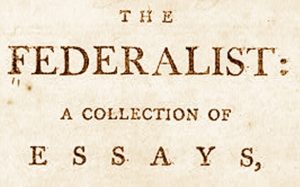 “Litigation about litigation,” usually in the form of a federal suit to enjoin or otherwise overcome a state-court case, can involve complicated federalism concepts such as the Rooker-Feldman doctrine or Younger abstention. The Fifth Circuit reiterated an even more basic principle in Machetta v. Moren, in which an unhappy party to a state court child custody case sought to assert civil rights claims against the judges: “The district court [correctly] dismissed the case because no case or controversy exists between ‘a judge who adjudicates claims under a statute and a litigant who attacks the constitutionality of the statute.'” No. 17-20533 (June 4, 2018, unpublished).
“Litigation about litigation,” usually in the form of a federal suit to enjoin or otherwise overcome a state-court case, can involve complicated federalism concepts such as the Rooker-Feldman doctrine or Younger abstention. The Fifth Circuit reiterated an even more basic principle in Machetta v. Moren, in which an unhappy party to a state court child custody case sought to assert civil rights claims against the judges: “The district court [correctly] dismissed the case because no case or controversy exists between ‘a judge who adjudicates claims under a statute and a litigant who attacks the constitutionality of the statute.'” No. 17-20533 (June 4, 2018, unpublished).
 Deutsch, who relies upon a wheelchair for mobility, contended that the parking lot of a local business did not comply with the ADA, and sought injunctive relief against the business. The trial court dismissed for lack of Article III standing and the Fifth Circuit affirmed. “Deutsch hoas not provided a description of any concrete plans to return to Travis County Shoe, and he also has not shown how the alleged ADA violations negatively affect his day-to-day life. Deutsch . . . had not been to Travis County Shoe before the day he alleges he encountered the ADA violations . . . [and] that he had not returned to the business since that day.” Deutsch v. Travis County Shoe Hospital, No. 16-51431 (Feb. 2, 2018, unpublished).
Deutsch, who relies upon a wheelchair for mobility, contended that the parking lot of a local business did not comply with the ADA, and sought injunctive relief against the business. The trial court dismissed for lack of Article III standing and the Fifth Circuit affirmed. “Deutsch hoas not provided a description of any concrete plans to return to Travis County Shoe, and he also has not shown how the alleged ADA violations negatively affect his day-to-day life. Deutsch . . . had not been to Travis County Shoe before the day he alleges he encountered the ADA violations . . . [and] that he had not returned to the business since that day.” Deutsch v. Travis County Shoe Hospital, No. 16-51431 (Feb. 2, 2018, unpublished).
 As a further reminder that “standing,” in all of the forms that idea takes, is a complicated set of doctrines, the Fifth Circuit held in Nevarez Law Firm v. Dona Ana Title Co.: “The district court relief on Rule 12(b)(1) when it dismissed Nevarez’s [RICO and state tort] claims with prejudice after concluding that there was no standing. That was error. ‘A dismissal with prejudice is a final judgment on the merits.’ We agree with an earlier opinion of this court that ‘to dismiss with prejudice under Rule 12(b)(1) is to disclaim jurisdiction and then exercise it.'” No. 17-50053 (Jan. 3, 2018, unpublished) (citations omitted).
As a further reminder that “standing,” in all of the forms that idea takes, is a complicated set of doctrines, the Fifth Circuit held in Nevarez Law Firm v. Dona Ana Title Co.: “The district court relief on Rule 12(b)(1) when it dismissed Nevarez’s [RICO and state tort] claims with prejudice after concluding that there was no standing. That was error. ‘A dismissal with prejudice is a final judgment on the merits.’ We agree with an earlier opinion of this court that ‘to dismiss with prejudice under Rule 12(b)(1) is to disclaim jurisdiction and then exercise it.'” No. 17-50053 (Jan. 3, 2018, unpublished) (citations omitted).
 In a reminder of the surprising complexity that can surround litigation about a party’s standing to bring a claim, in Intrepid Ship Mgmnt v. Malin Int’l Ship Repair, the Fifth Circuit noted a source of potential confusion about the applicable procedure: “Although a dismissal for lack of standing is appropriately judged under Federal Rule of Civil Procedure 12(b)(1), which allows a court to make limited findings of fact, the parties have argued this case under the standards applicable to ordinary summary judgment motions. Compare Lane v. Halliburton, 529 F.3d 548, 557 (5th Cir. 2008) (explaining that the district court can resolve disputed facts as necessary to decide a challenge to subject atter jurisdiction), withInt’l Marine LLC v. Integrity Fisheries, Inc., 860 F.3d 754, 759 (5th Cir. 2017) (applying de novo review to summary judgment cases, explaining that “[s]ummary judgment is appropriate when ‘there is no genuine dispute as to any material fact.’”)”. No. 16-41074 (Oct. 11, 2017) (unpublished).
In a reminder of the surprising complexity that can surround litigation about a party’s standing to bring a claim, in Intrepid Ship Mgmnt v. Malin Int’l Ship Repair, the Fifth Circuit noted a source of potential confusion about the applicable procedure: “Although a dismissal for lack of standing is appropriately judged under Federal Rule of Civil Procedure 12(b)(1), which allows a court to make limited findings of fact, the parties have argued this case under the standards applicable to ordinary summary judgment motions. Compare Lane v. Halliburton, 529 F.3d 548, 557 (5th Cir. 2008) (explaining that the district court can resolve disputed facts as necessary to decide a challenge to subject atter jurisdiction), withInt’l Marine LLC v. Integrity Fisheries, Inc., 860 F.3d 754, 759 (5th Cir. 2017) (applying de novo review to summary judgment cases, explaining that “[s]ummary judgment is appropriate when ‘there is no genuine dispute as to any material fact.’”)”. No. 16-41074 (Oct. 11, 2017) (unpublished).
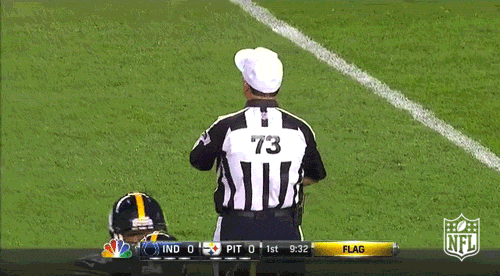 In a 2-1 decision, the Fifth Circuit found that Ezekiel Elliott failed to exhaust remedies within the NFL’s dispute-resolution process before filing suit, meaning that the federal courts lacked subject matter jurisdiction over his complaints. A dissent found a sufficient question about the adequacy of the process to justify the exercise of jurisdiction under the relevant authorities. NFLPA v. NFL, No. 17-40936 (Oct. 12, 2017). While of enormous interest to Cowboys fans, so far as arbitration goes, the opinion is centered on issues unique to collective bargaining agreements.
In a 2-1 decision, the Fifth Circuit found that Ezekiel Elliott failed to exhaust remedies within the NFL’s dispute-resolution process before filing suit, meaning that the federal courts lacked subject matter jurisdiction over his complaints. A dissent found a sufficient question about the adequacy of the process to justify the exercise of jurisdiction under the relevant authorities. NFLPA v. NFL, No. 17-40936 (Oct. 12, 2017). While of enormous interest to Cowboys fans, so far as arbitration goes, the opinion is centered on issues unique to collective bargaining agreements.
As a counterpoint to the recent case of Boerschig v. Trans-Pecos Pipeline, which rejected a mootness challenge in an injunction case about a condemnation (reasoning that the court could still “order that Trans-Pecos return Boerschig’s land to its precondemnation state.”), there is Dick v. Colorado Housing Enterprises, LLC, which  found a request for an injunction became moot after the allegedly wrongful foreclosure occurred (rejecting “Plaintiff-Appellant[‘s] assert[ion] that because the Defendants-Appellees were the successful bidders at the foreclosure sale, this court can order them to cancel or rescind the foreclosure sale.”) The distinction between the two rests on case law unique to foreclosures, which the Dick panel used the Fifth Circuit’s “rule of orderliness” to organize and apply. No. 17-10357 (Oct. 4, 2017).
found a request for an injunction became moot after the allegedly wrongful foreclosure occurred (rejecting “Plaintiff-Appellant[‘s] assert[ion] that because the Defendants-Appellees were the successful bidders at the foreclosure sale, this court can order them to cancel or rescind the foreclosure sale.”) The distinction between the two rests on case law unique to foreclosures, which the Dick panel used the Fifth Circuit’s “rule of orderliness” to organize and apply. No. 17-10357 (Oct. 4, 2017).
 Total Gas, the American subsidiary of the large French energy concern, sued for a declaratory judgment that FERC could not impose certain penalties under the Natural Gas Act. But while FERC had begun an administrative proceeding against Total, that case had to proceed through several more steps before any penalty would be assessed. Accordingly, the dispute was not ripe for adjudication. The “step by step” analysis of ripeness in this case appears to be of general applicability to other cases involving conditions precedent. Total Gas v. FERC, No. 16-20642 (June 8, 2017).
Total Gas, the American subsidiary of the large French energy concern, sued for a declaratory judgment that FERC could not impose certain penalties under the Natural Gas Act. But while FERC had begun an administrative proceeding against Total, that case had to proceed through several more steps before any penalty would be assessed. Accordingly, the dispute was not ripe for adjudication. The “step by step” analysis of ripeness in this case appears to be of general applicability to other cases involving conditions precedent. Total Gas v. FERC, No. 16-20642 (June 8, 2017).
 Moore sued the Governor of Mississippi, alleging that the presence of the Confederate battle flag in the Mississippi state flag (right) violated Moore’s rights under the Equal Protection Clause. The Fifth Circuit affirmed dismissal on standing grounds, distinguishing cases involving the First Amendment’s Establishment Clause because of the distinct injuries addressed by the two Constitutional provisions. The Court concluded: “The assumption that if [Plainitff] had no standing to sue, no one would have standing, is not a reason to find standing.” (citations omitted). Moore v. Bryant, No. 16-60616 (March 31, 2017).
Moore sued the Governor of Mississippi, alleging that the presence of the Confederate battle flag in the Mississippi state flag (right) violated Moore’s rights under the Equal Protection Clause. The Fifth Circuit affirmed dismissal on standing grounds, distinguishing cases involving the First Amendment’s Establishment Clause because of the distinct injuries addressed by the two Constitutional provisions. The Court concluded: “The assumption that if [Plainitff] had no standing to sue, no one would have standing, is not a reason to find standing.” (citations omitted). Moore v. Bryant, No. 16-60616 (March 31, 2017).
 Sessa Capital, a hedge fund, supported the election of certain directors to the board of Ashford Prime, a hotel business. Ashford’s management rejected their applications, contending that they were incomplete. Litigation ensued, in which Sessa sought an injunction against the June 10, 2016 board election. The district court denied relief; Sessa appealed, and a motions panel of the Fifth Circuit denied an interim stay.
Sessa Capital, a hedge fund, supported the election of certain directors to the board of Ashford Prime, a hotel business. Ashford’s management rejected their applications, contending that they were incomplete. Litigation ensued, in which Sessa sought an injunction against the June 10, 2016 board election. The district court denied relief; Sessa appealed, and a motions panel of the Fifth Circuit denied an interim stay.
Since that election proceeded, mootness became an obvious appellate issue. The Fifth Circuit noted that “Sessa did not ask the district court to stay the [June 10] election,” and also “never sought the invalidation of the shareholder election in the district court” — requests that, had they been made, could potentially have kept the dispute alive. To the contrary, the Court observed that “Sessa repeatedly made a tactical decision to seek only prospective relief. When the district court contemplated pressing the reset button by staying the shareholder election and allowing Sessa to resubmit the questionnaires, Sessa vehemently opposed this solution.” Accordingly, the Court dismissed the appeal as moot. Ashford Hospitality Prime, Inc. v. Sessa Capital, No. 16-10671 (Dec. 16, 2016, unpublished).
 Cotton v. Certain Underwriters at Lloyds, a dispute about payment for wind damage from Hurricane Isaac, presented an issue about who was entitled to sue. The Fifth Circuit reminded that “‘Standing’ . . . is a label used to describe different things in the law.” One use is “whether a party has a right to sue under a contr
Cotton v. Certain Underwriters at Lloyds, a dispute about payment for wind damage from Hurricane Isaac, presented an issue about who was entitled to sue. The Fifth Circuit reminded that “‘Standing’ . . . is a label used to describe different things in the law.” One use is “whether a party has a right to sue under a contr act.” That use, which presents “an issue of ‘contract interpretation,'” is “entirely distinct from ‘standing’ for purposes of Article III” and its jurisdictional consequences. No. 15-31005 (Aug. 1, 2016).
act.” That use, which presents “an issue of ‘contract interpretation,'” is “entirely distinct from ‘standing’ for purposes of Article III” and its jurisdictional consequences. No. 15-31005 (Aug. 1, 2016).
 Litigation about the failed drilling of an oil well led to insurance litigation under Louisiana’s Direct Action Statute. The district court granted summary judgment to the insured as to its insurers’ duty to indemnify, and the Fifth Circuit reversed, finding that the indemnity issue was not yet justiciable: “[I]t is readily apparent that ‘facts can be developed’ at trial that would support a finding that at least some of [the insured’s] conduct related to the failed directional drilling project triggered coverage under the relevant policies. Beyond the already existing testimony . . . [the insured] points to a number of witnesses who were not deposed but who could testify at trial on relevant issues such as subcontractors, surveyors, and consultants.” Solstice Oil & Gas LLC v. Seneca Ins. Co., No. 15-30874 (July 21, 2016).
Litigation about the failed drilling of an oil well led to insurance litigation under Louisiana’s Direct Action Statute. The district court granted summary judgment to the insured as to its insurers’ duty to indemnify, and the Fifth Circuit reversed, finding that the indemnity issue was not yet justiciable: “[I]t is readily apparent that ‘facts can be developed’ at trial that would support a finding that at least some of [the insured’s] conduct related to the failed directional drilling project triggered coverage under the relevant policies. Beyond the already existing testimony . . . [the insured] points to a number of witnesses who were not deposed but who could testify at trial on relevant issues such as subcontractors, surveyors, and consultants.” Solstice Oil & Gas LLC v. Seneca Ins. Co., No. 15-30874 (July 21, 2016).
 The Texas Package Sales Association, a trade association of alcohol sellers, moved for relief under Fed. R. Civ. P. 60(b) from a longstanding injunction against the enforcement of a residency requirement for sales permits. The Fifth Circuit concluded:
The Texas Package Sales Association, a trade association of alcohol sellers, moved for relief under Fed. R. Civ. P. 60(b) from a longstanding injunction against the enforcement of a residency requirement for sales permits. The Fifth Circuit concluded:
- While not a plaintiff in the original litigation, TPSA had intervened in it, and could challenge the permanent injunction; and
- TPSA had standing as an organization to sue about the requirement; but
- Subsequent Supreme Court opinions about the Commerce Clause did not create an intervening change in the law that would justify Rule 60(b) relief original litigation; and
- TPSA had not adequately placed at issue the alternative ground for the injunction, based on the Privileges and Immunities Clause.
A dissent would not have found that TPSA had standing to sue, characterizing its suit as an effort “to substitute itself . . for the state authorities” with jurisdiction over the applicable law. Cooper v. TABC, No. 14-51343 (April 21, 2016).
 The plaintiffs in Wendt v. 24 Hour Fitness USA, Inc. complained about several violations of the Texas Health Spa Act in the form membership contract of 24 Hour Fitness. Noting the specific remedies provided by that Act, the Fifth Circuit held: “We agree with the district court that Plaintiffs suffered no injury-in-fact. 24 Hour’s alleged violations of the Act did not harm Plaintiffs in any way. To the contrary, 24 Hour gave Plaintiffs exactly what they paid for: access to a gym. Plaintiffs therefore lack Article III standing, and the district court
The plaintiffs in Wendt v. 24 Hour Fitness USA, Inc. complained about several violations of the Texas Health Spa Act in the form membership contract of 24 Hour Fitness. Noting the specific remedies provided by that Act, the Fifth Circuit held: “We agree with the district court that Plaintiffs suffered no injury-in-fact. 24 Hour’s alleged violations of the Act did not harm Plaintiffs in any way. To the contrary, 24 Hour gave Plaintiffs exactly what they paid for: access to a gym. Plaintiffs therefore lack Article III standing, and the district court
properly dismissed the case.” No. 15-10309 (April 13, 2016).
 A clear disability — a child rendered incompetent by a debilitating medical condition — gave rise to complicated standing and capacity issues in Rideau v. Keller ISD, No. 15-10095 (April 5, 2016). The child, the beneficiary of a trust established in his behalf as a result of the incident that caused his condition, sought damages from his school district for mistreatment by his special education teacher. The Fifth Circuit found that the child had standing to seek recovery for his home care expenses, notwithstanding “[t]he existence of a third-party payor in the form of a trust created by a prior tortfeasor.” The Court then agreed with the defendant that Texas law gave the bank who administered the child’s trust the exclusive right to file suit for other damages, and not his parents. It concluded, however, that this problem had been cured by the bank’s ratification of the parents’ action under the rarely-applied but very practical Fed. R. Civ. P. 17(a)(3). (I congratulate my LPCH colleague John Guild on his work for the plaintiffs in this case.)
A clear disability — a child rendered incompetent by a debilitating medical condition — gave rise to complicated standing and capacity issues in Rideau v. Keller ISD, No. 15-10095 (April 5, 2016). The child, the beneficiary of a trust established in his behalf as a result of the incident that caused his condition, sought damages from his school district for mistreatment by his special education teacher. The Fifth Circuit found that the child had standing to seek recovery for his home care expenses, notwithstanding “[t]he existence of a third-party payor in the form of a trust created by a prior tortfeasor.” The Court then agreed with the defendant that Texas law gave the bank who administered the child’s trust the exclusive right to file suit for other damages, and not his parents. It concluded, however, that this problem had been cured by the bank’s ratification of the parents’ action under the rarely-applied but very practical Fed. R. Civ. P. 17(a)(3). (I congratulate my LPCH colleague John Guild on his work for the plaintiffs in this case.)
 NiGen alleged that the Texas Attorney General systematically sent harassing letters to retailers, warning against stocking its “amino acid building blocks” product. At least as to future activity by the AG, the Fifth Circuit found that NiGen had standing to complain and could allege a claim for injunctive relief to enforce federal law under Ex parte Young: “None of these cases sought, like NiGen’s, to lift a yoke of alleged unconstitutional conduct from the plaintiff’s own shoulders.” NiGen Biotech, LLC v. Paxton, No. 14-10923 (Sept. 23, 2015).
NiGen alleged that the Texas Attorney General systematically sent harassing letters to retailers, warning against stocking its “amino acid building blocks” product. At least as to future activity by the AG, the Fifth Circuit found that NiGen had standing to complain and could allege a claim for injunctive relief to enforce federal law under Ex parte Young: “None of these cases sought, like NiGen’s, to lift a yoke of alleged unconstitutional conduct from the plaintiff’s own shoulders.” NiGen Biotech, LLC v. Paxton, No. 14-10923 (Sept. 23, 2015).
 An appeal in a dispute between the Iraqi oil ministry and the Kurdistan governmental authority (“KRG”) ended in dismissal for mootness, after the tanker with the relevant oil “weighed anchor . . and . . . sailed to Ahkelon, Israel[.]” (The ship at issue, UNITED KALAVRYTA, appears at right and is presently underway in the Black Sea.) The Fifth Circuit rejected several arguments by the KRG that the dispute remained live, including:
An appeal in a dispute between the Iraqi oil ministry and the Kurdistan governmental authority (“KRG”) ended in dismissal for mootness, after the tanker with the relevant oil “weighed anchor . . and . . . sailed to Ahkelon, Israel[.]” (The ship at issue, UNITED KALAVRYTA, appears at right and is presently underway in the Black Sea.) The Fifth Circuit rejected several arguments by the KRG that the dispute remained live, including:
- Any request in the complaint for a declaratory judgment was merely ancillary to the claim to recover the tanker under admiralty law;
- No claim for interest remained because the Ministry sought to recover the oil, not money damages;
- The “such other and further relief” clause at the end of the complaint was not a pleading for money damages; and
- “[H]ypothetical future shipments do not prevent the dispute regarding the Cargo at issue here from being moot.”
The Court also rejected a request by the  KRG for vacatur of the lower court’s decision, noting in particular that “the KRG mooted this appeal through its voluntary decision to discharge the Cargo in Israel. In so doing, the KRG severely weakened its argument for equitable relief.” Ministry of Oil of the Republic of Iraq v. Kurdistan Region of Iraq, No. 15-40062 (Sept. 21, 2015, unpublished).
KRG for vacatur of the lower court’s decision, noting in particular that “the KRG mooted this appeal through its voluntary decision to discharge the Cargo in Israel. In so doing, the KRG severely weakened its argument for equitable relief.” Ministry of Oil of the Republic of Iraq v. Kurdistan Region of Iraq, No. 15-40062 (Sept. 21, 2015, unpublished).
 McGowan successfully sued his employer, Tractor Supply Co., for over $8 million in damages after a severe workplace injury. In the meantime, TSC’s umbrella carrier sued TSC and another carrier for a declaration about coverage obligations. The district court dismissed for lack of standing, and pursuant to its discretion under the Declaratory Judgment Act. The Fifth Circuit reversed; its principal holdings were: (1) under Texas insurance law, this sort of suit is justiciable after a liability determination at trial, and does not require exhaustion of appellate remedies; (2) the issues and parties were different in the two actions; and (3) the declaratory judgment suit was filed after the state case and otherwise showed “no indication of procedural fencing.” Ironshore Specialty Ins. Co. v. Tractor Supply Co. 14-51164 (Aug. 25, 2015, unpublished)
McGowan successfully sued his employer, Tractor Supply Co., for over $8 million in damages after a severe workplace injury. In the meantime, TSC’s umbrella carrier sued TSC and another carrier for a declaration about coverage obligations. The district court dismissed for lack of standing, and pursuant to its discretion under the Declaratory Judgment Act. The Fifth Circuit reversed; its principal holdings were: (1) under Texas insurance law, this sort of suit is justiciable after a liability determination at trial, and does not require exhaustion of appellate remedies; (2) the issues and parties were different in the two actions; and (3) the declaratory judgment suit was filed after the state case and otherwise showed “no indication of procedural fencing.” Ironshore Specialty Ins. Co. v. Tractor Supply Co. 14-51164 (Aug. 25, 2015, unpublished)
 Hooks sued Landmark Industries, the operator of an ATM, as the representative of a putative class alleging that Landmark failed to give proper notices under the Electronic Funds Transfer Act about withdrawal fees. Hooks v. Landmark Industries, Inc., No. 14-20496 (Aug. 12, 2015). Pursuant to Fed. R. Civ. P. 68, Landmark offered $1,000 (the maximum allowable statutory damages) and costs and fees “through the date of acceptance of the offer, as agreed by the parties, or to be determined by the court if agreement cannot be reached.” Hooks did not accept it, and the district court dismissed, finding the action mooted by the unaccepted Rule 68 offer.
Hooks sued Landmark Industries, the operator of an ATM, as the representative of a putative class alleging that Landmark failed to give proper notices under the Electronic Funds Transfer Act about withdrawal fees. Hooks v. Landmark Industries, Inc., No. 14-20496 (Aug. 12, 2015). Pursuant to Fed. R. Civ. P. 68, Landmark offered $1,000 (the maximum allowable statutory damages) and costs and fees “through the date of acceptance of the offer, as agreed by the parties, or to be determined by the court if agreement cannot be reached.” Hooks did not accept it, and the district court dismissed, finding the action mooted by the unaccepted Rule 68 offer.
Sidestepping the thorny question of whether this offer was “complete” under Rule 68, the Fifth Circuit reversed. It reasoned: “[i]t is hornbook law that the rejection of an offer nullifies the offer,” and expressed concern that “[a] contrary ruling would serve to allow defendants to unilaterally moot named-plaintiffs’ claims in the class action context — even though the plaintiff, having turned the offer down, would receiver no actual relief. This holding places the Fifth Circuit in the minority of a 6-3 circuit split on the issue of whether an unaccepted offer of judgment can moot a named plaintiff’s claim in a putative class action.
 Plaintiff challenged a proposed development plan as violating the Fair Housing Act. Defendants argued “that because the planned redevelopment is both inchoate and designed to be mixed income and to attract a variety of tenants, [Plaintiff] can only speculate as to whether, if redevelopment proceeds, it will deprive her of the social and economic benefits of diversity,” and thus lacked standing. The Fifth Circuit disagreed, finding that her “asserted injury would be concretely felt in the logical course of probably events flowing from an unfavorable decision by this court: (1) HUD approves the already-pending plan for redevelopment; (2) redevelopment occurs according to the approved plan; [and] (3) segregation and minority- and poverty-concentration occur in [Plaintiff’s] neighborhood as specifically anticipated in several expert reports contained in the record.” The Court distinguished Clapper v. Amnesty International, 133 S. Ct. 1138 (2013), a recent case about the Foreign Intelligence Surveillance Act, as “depend[ing] on a long and tenuous chain of contingent events[.]” McCardell v. U.S. Dep’t of Housing & Urban Devel., No. 14-40955 (July 23, 2015).
Plaintiff challenged a proposed development plan as violating the Fair Housing Act. Defendants argued “that because the planned redevelopment is both inchoate and designed to be mixed income and to attract a variety of tenants, [Plaintiff] can only speculate as to whether, if redevelopment proceeds, it will deprive her of the social and economic benefits of diversity,” and thus lacked standing. The Fifth Circuit disagreed, finding that her “asserted injury would be concretely felt in the logical course of probably events flowing from an unfavorable decision by this court: (1) HUD approves the already-pending plan for redevelopment; (2) redevelopment occurs according to the approved plan; [and] (3) segregation and minority- and poverty-concentration occur in [Plaintiff’s] neighborhood as specifically anticipated in several expert reports contained in the record.” The Court distinguished Clapper v. Amnesty International, 133 S. Ct. 1138 (2013), a recent case about the Foreign Intelligence Surveillance Act, as “depend[ing] on a long and tenuous chain of contingent events[.]” McCardell v. U.S. Dep’t of Housing & Urban Devel., No. 14-40955 (July 23, 2015).
 HUD suspended a mortgage lender from doing business with the government; after some litigation, HUD withdrew the suspensions. In the meantime, the lender had appealed the district court’s ruling that upheld the suspensions, and argued that it was not moot after the withdrawal. The Fifth Circuit disagreed, finding that the requested declaration that the suspension was unlawful is “no longer embedded in an actual controversy about the appellants’ legal rights.” The Court rejected arguments based on the “voluntary-cessation” and
HUD suspended a mortgage lender from doing business with the government; after some litigation, HUD withdrew the suspensions. In the meantime, the lender had appealed the district court’s ruling that upheld the suspensions, and argued that it was not moot after the withdrawal. The Fifth Circuit disagreed, finding that the requested declaration that the suspension was unlawful is “no longer embedded in an actual controversy about the appellants’ legal rights.” The Court rejected arguments based on the “voluntary-cessation” and  “collateral consequences,” emphasizing the specific posture of the lender’s situation with the government and the specifics of the regulatory environment. The Court also rejected an argument based on the past economic losses, noting that the lender was not seeking damages and could not under the applicable statute. Allied Home Mortgage Corp. v. U.S. Dep’t of Housing & Urban Devel., No. 14-20523 (July 22, 2015, unpublished).
“collateral consequences,” emphasizing the specific posture of the lender’s situation with the government and the specifics of the regulatory environment. The Court also rejected an argument based on the past economic losses, noting that the lender was not seeking damages and could not under the applicable statute. Allied Home Mortgage Corp. v. U.S. Dep’t of Housing & Urban Devel., No. 14-20523 (July 22, 2015, unpublished).
 In a 2-1 decision, the Fifth Circuit has denied the federal government’s request to stay the district court’s injunction against key elements of President Obama’s immigration policy. Texas v. United States, No. 15-40238 (May 26, 2015). Judge Higginson’s dissent concludes that the issues before the Court are nonjusticiable. Judge Smith’s majority (joined by Judge Elrod), made these key points:
In a 2-1 decision, the Fifth Circuit has denied the federal government’s request to stay the district court’s injunction against key elements of President Obama’s immigration policy. Texas v. United States, No. 15-40238 (May 26, 2015). Judge Higginson’s dissent concludes that the issues before the Court are nonjusticiable. Judge Smith’s majority (joined by Judge Elrod), made these key points:
- On standing — “Texas’s forced choice between incurring costs and changing its fee structure is itself an injury: A plaintiff suffers an injury even if it can avoid that injury by incurring other costs. And being pressured to change state law constitutes an injury,”‘
- On the statutory merits — “[E]ven granting ‘special deference,’ the INA provisions cited by the government for that proposition cannot reasonably be construed, at least at this early stage of the case, to confer unreviewable discretion,” and
- On the APA issue — “But a rule can be binding if it is ‘applied by the agency in a way that indicates it is binding,’ and the states offered evidence from DACA’s implementation that DAPA’s discretionary language was pretextual.”
At issue in North Cypress Medical Center Operating Co. v. Cigna Healthcare was a basic aspect of the structure of a “preferred provider” insurance program. Under the many policies at issue, “in-network” providers receive more reimbursement than “out-of-network” ones, as an incentive to seek treatment in-network. With respect to the portion of the bill as to which patients had responsibility, certain providers provided “prompt pay” discounts. Insurers disputed whether they were then still responsible for the entire billed amount, or should have their responsibility reduced by a corresponding discount. The Fifth Circuit found that the patients, and thus the providers to whom they assigned their claims, had standing to litigate about this situation (reversing a district court ruling to the contrary). It also found that ERISA preempted state law claims about these issues, that limitations applied (without tolling) to compulsory counterclaims by insurers that sought affirmative relief rather than recoupment, and affirmed the dismissal of RICO claims by the provider. The litigation seems likely to continue, and to produce more issues about complicated and significant ERISA and procedural points. No. 12-20695 (March 10, 2015).
 Superior MRI Services sued for tortious interference with contract; the defendant argued that Superior lacked standing because it never acquired rights under the relevant contracts, and the Fifth Circuit agreed. Superior MRI Services, Inc. v. Alliance Imaging, Inc., No. 14-60087 (Feb. 18, 2015). The record showed that P&L Imaging, a bankruptcy debtor, listed “MRI service agreements” on its schedule of assignments to Superior, with an assignment date of October 1, 2011. Superior, however, did not exist as a legal entity until November 28, 2011. No evidence showed that Superior ratified the contract after its formation, and the Court was unwilling to accept Mississippi’s approval of Superior as a vendor as evidence of a ratification. The Court distinguished the recent case of Lexmark, Int’l v. Static Control Components, 134 S. Ct. 1377 (2014), as relating to another aspect of the standing requirement.
Superior MRI Services sued for tortious interference with contract; the defendant argued that Superior lacked standing because it never acquired rights under the relevant contracts, and the Fifth Circuit agreed. Superior MRI Services, Inc. v. Alliance Imaging, Inc., No. 14-60087 (Feb. 18, 2015). The record showed that P&L Imaging, a bankruptcy debtor, listed “MRI service agreements” on its schedule of assignments to Superior, with an assignment date of October 1, 2011. Superior, however, did not exist as a legal entity until November 28, 2011. No evidence showed that Superior ratified the contract after its formation, and the Court was unwilling to accept Mississippi’s approval of Superior as a vendor as evidence of a ratification. The Court distinguished the recent case of Lexmark, Int’l v. Static Control Components, 134 S. Ct. 1377 (2014), as relating to another aspect of the standing requirement.
Mabary withdrew money from an A TM machine. While she received an on-screen notice about a $2.00 fee, the machine did not have a posted external notice about the fee — a violation of the Electronic Funds Transfer Act at the time. After amendments to the EFTA that eliminated the Bank’s liability (if applicable), the district court dismissed Mabary’s claim and denied certification of a related class. Mabary v. Home Town Bank, N.A., No. 13-20211 (Nov. 5, 2014). The Fifth Circuit reversed, holding: (1) Mabary had Article III standing as a result of EFTA’s definition of injury, even though she did receive a form of notice; (2) a Rule 68 offer of proof to her – precertification – did not moot her claim; and (3) EFTA’s
TM machine. While she received an on-screen notice about a $2.00 fee, the machine did not have a posted external notice about the fee — a violation of the Electronic Funds Transfer Act at the time. After amendments to the EFTA that eliminated the Bank’s liability (if applicable), the district court dismissed Mabary’s claim and denied certification of a related class. Mabary v. Home Town Bank, N.A., No. 13-20211 (Nov. 5, 2014). The Fifth Circuit reversed, holding: (1) Mabary had Article III standing as a result of EFTA’s definition of injury, even though she did receive a form of notice; (2) a Rule 68 offer of proof to her – precertification – did not moot her claim; and (3) EFTA’s  amendments did not fall within the exception to the general presumption against statutory retroactivity. A dissent took issue with the standing holding as “respectfuly, silly stuff,” reasoning: “Mabary cannot show that she suffered a cognizable injury in fact, so she can sue only if the existence of her statutory cause of action sufficed to satisfy Article III.”
amendments did not fall within the exception to the general presumption against statutory retroactivity. A dissent took issue with the standing holding as “respectfuly, silly stuff,” reasoning: “Mabary cannot show that she suffered a cognizable injury in fact, so she can sue only if the existence of her statutory cause of action sufficed to satisfy Article III.”
A mortgage servicer sued two individuals, alleging a conspiracy to defraud; the defendants argued that the servicer lacked standing because the notes in question were not properly conveyed. The case settled during trial, and as part of the settlement “the parties stipulated to several facts, including the fact that the Trusts were the owners and holders of the Loans at issue.” An agreed judgment followed. BAC Home Loans Servicing, L.P. v. Groves, No. 13-20764 (Nov. 3, 2014, unpublished).
The defendants then moved to vacate under FRCP 60(b), arguing that the plaintiff lacked standing. The district court denied the motion and the Fifth Circuit affirmed. It first noted that “the court will generally enforce valid appeal waivers, [but] a party cannot waive Article III standing by agreement . . .” Further noting that “parties may stipulate to facts but not legal conclusions,” the Court held: “That is exactly what happened here. [Defendants] conceded facts that establish [plainitiff’s] status; thus, the district court appropriately reached the resulting legal conclusion that [plaintiff] has standing.”
But all these years that I’ve been here, ain’t nobody got past Red – except Article III.
October 29, 2014“Those who prefer to hunt deer without the use of dogs (still-deer hunters) complain that
dog-deer hunting is disruptive and unsportsmanlike. Adjacent landowners complain that dog-deer hunting leads to shooting near houses and from roads, fights between dog-deer hunters and landowners, roads being blocked by dog-deer hunters, dogs running across private property, and trespass. Dog-deer hunters defend the practice based on its history as a traditional method of hunting in Louisiana dating back to the colonial period.” The plaintiffs in Louisiana Sportsmen Alliance, LLC v. Vilsack sought to enjoin the U.S. Forest Service from banning dog-deer hunting in the Kisatchie National Forest. The Forest Service won on the merits in the district court, and for the first time on appeal, argued that the plaintiff organization lacked standing. Expressing vexation: “The district court was ill-served by the Forest Service in this regard, because the Forest Service never argued that the Alliance lacked organizational standing until this appeal,” the Court nevertheless considered the issue because “Article III standing is a jurisdictional requirement that cannot be waived,” and then dismissed the appeal because the plaintiff association had not shown its standing to bring suit. No.13-31260 (Oct. 28, 2014, unpublished).
The Fifth Circuit and the district court agreed that the plaintiffs/appellants in Mboho USA, Inc. v. Okon had served “abusively excessive, repetitious, and burdensome discovery requests.” No. 13-20449 (Oct. 10, 2014, unpublished). But, the Fifth Circuit found that the district court had acted too hastily in dismissing the case entirely, noting:
(1) the plaintiff, a foreign entity, was not foreclosed from suing in Texas simply because it is not registered to do business there;
(2) one of the appellants had legitimate documents from the Nigerian government authorizing him to bring suit in the US or Canada;
(3) an earlier dismissal in state court for lack of subject matter jurisdiction was not preclusive as to another court with jurisdiction; and
(4) as to one of the claims, plaintiffs were entitled to an opportunity to respond before it was dismissed sua sponte.
Aristotle on BP’s Deepwater Horizon settlement: “[T]he structure of the best tragedy should not be simple but complex . . . “
May 21, 2014The Fifth Circuit has now resolved the challenges to BP’s Deepwater Horizon settlement, as follows:
1. In October 2013, in three separate opinions, First Panel remanded for more fact findings as to accounting issues about the settlement.
2. In January 2014, in a 2-1 decision, Second Panel affirmed the settlement over challenges based on Rule 23 and related standing issues.
3. In March 2014, satisfied with the results of the remand, First Panel affirmed the mechanics of the settlement in a 2-1 decision.
4. On May 19, 2014:
A. First Panel denies panel rehearing, concluding in a 2-1 opinion: “In settling this lawsuit, the parties agreed on a substitute for direct proof of causation by a preponderance of the evidence. By settling this lawsuit and agreeing to the evidentiary framework for submitting claims, the claimants did not abandon their allegations of Article III causation.”
B. Second Panel also denies panel rehearing, also in a 2-1 opinion, noting its “complete agreement” with the denial of panel rehearing by First Panel.
C. The full court denied en banc rehearing as to First Panel and also as to Second Panel, both over dissents that stressed Article III issues.
The Fifth Circuit released a slightly revised opinion in Excel Willowbrook LLC v. JP Morgan Chase Bank, No. 12-20367 (revised April 24, 2014), a dispute about the FDIC’s rights upon assigning the assets of a failed bank. Of particular interest is the new footnote 34, which observes: “[T]he continued vitality of prudential ‘standing’ is now uncertain in the wake of the Supreme Court’s recent decision in Lexmark International, Inc. v. Static Control Components, Inc., 134 S. Ct. 1377 (2014). See id. at 1388 (‘[A] court . . . cannot limit a cause of action . . . merely because “prudence” dictates.’).”
Payne sued Progressive Financial for violations of fair debt collection statutes, seeking statutory damages, actual damages, attorneys fees, and costs. Payne v. Progressive Financial Services, No. 13-10381 (April 7, 2014). Progressive made a Rule 68 offer of $1,001 in damages and fees to the date of the offer, to which Payne did not respond. The district court reasoned that Payne had not pleaded a basis to recover actual damages, and that the unaccepted offer mooted her claim for statutory damages because it exceeded the amount she could recover. The Fifth Circuit reversed, finding that the district court’s analysis of the actual damages claim conflated jurisdiction with resolution of the merits; accordingly, Progressive’s offer was incomplete because it did not address actual damages. A footnote reminds that a complete Rule 68 offer can moot a case, and that the Court did not reach the argument that the offer was incomplete because it did not include post-offer fees and costs.
BP’s continuing efforts to reduce the scope of its Deepwater Horizon settlement program again produced three separate opinions from a panel in In re Deepwater Horizon (several cause numbers, March 3, 2014). Judge Southwick found that the plan’s requirement of a “certification on the document that the claimant was injured by the Deepwater Horizon disaster” resolved any lingering jurisdictional issues. Judge Dennis concurred in a shorter opinion. Judge Clement dissented, arguing: “This agreement, as implemented, is using the powers of the federal courts to enforce obligations unrelated to actual cases or controversies.”
In Wells Fargo Capital Finance v. Noble, Wells Fargo faced a class action in California. It attempted to get an antisuit injunction from a Texas bankruptcy court, which was denied. No.13-10468 (Feb. 5, 2014, unpublished). The Fifth Circuit found the appeal moot, because Wells’s briefing focused on a consolidated complaint in the class case that was amended after the appeal began. While the Court noted: “An amended complaint supersedes the original complaint and renders it of no legal effect unless the amended complaint specifically refers to and adopts or incorporates by reference the earlier pleading,” it did not resolve the appeal on that basis, simply finding that the new complaint significantly changed the relevant issues.
After a recent panel remanded an appeal about the Deepwater Horizon settlement for further proceedings about its payment formula, another panel examined challenges to the settlement based on the guidelines of Rule 23, the Rules Enabling Act, and Article III. In re Deepwater Horizon — Appeals of the Economic and Property Damage Class Action Settlement, No. 13-30095 (Jan. 10, 2014). The panel found that, at the stage of certifying a settlement class, it did not violate those guidelines to have class members who may not be able to prove causation or damages on the merits: “It is sufficient for standing purposes that the plaintiffs seek recovery for an economic harm that they allege they have suffered, because we assume arguendo the merits of their claims at the Rule 23 stage.” In particular, the panel found that outcome consistent with Wal-Mart v. Dukes, 131 S. Ct. 2541 (2011), as it requires evidence “that a particular contention is common, but not that it is correct.” The panel also found no abuse of discretion in the district court’s handling of subclasses or damage calculations. A dissent contended: “Absent an actual causation requirement for all class members, Rule 23 is not being used to simply aggregate similar cases and controversies, but rather to impermissibly extend the judicial power of the United States into administering a private handout program.
The district court handling the Deepwater Horizon litigation rebuffed BP’s complaints that the agreed-upon claims processing formula was not working correctly. Lake Eugenie Land & Development v. BP Exploration & Production, No. 13-30315 (Oct. 2, 2013). A fractured opinion from the Fifth Circuit reversed in substantial part. It required remand for further development of the record on how the agreement was intended to handle several accounting issues about claimed losses. The Court then imposed a “tailored stay” on further payments to “allow[] the time necessary for deliberate reconsideration of these significant issues on remand.” Judge Clement wrote the plurality, which Judge Southwick joined on the foregoing grounds. Her opinion went on to note that, for standing reasons, a court lacked jurisdiction to administer a settlement “that included [class] members that had not sustained losses at all, or had sustained losses unrelated to the oil spill . . . .” Judge Dennis dissented as to the reasons for remand and disagreed with the standing analysis.
A case about Medicare reimbursement for a “mobile stander” wheelchair became moot on appeal when the state agency found it was not medically necessary. The Fifth Circuit dismissed the case and also vacated the district court opinion and judgment, noting legal errors in the opinion and discrepancy between the opinion and judgment. In light of all the circumstances, the Court concluded that vacatur was in “the public interest.” Koenning v. Janek, 12-41187 (Aug. 20, 2013, unpublished).
Texas allows charitable bingo if the sponsoring organization does not use the proceeds for political advocacy; several charities challenged that restriction on First Amendment grounds. Department of Texas, VFW v. Texas Lottery Commission, No. 11-50932 (August 21, 2013). In a new opinion issued on panel rehearing, the Fifth Circuit rejected a standing challenge based on the interplay of the relevant law with other gambling laws (which the state argued made the lawsuit irrelevant), and then reversed an injunction against the law. The Court saw the case as controlled by Rust v. Sullivan, 500 U.S. 173 (1991), noting: “The challenged provisions in this case do nothing to restrict speech outside the scope of the State’s bingo program. Charities are free to participate in the bingo program and engage in political advocacy; they simply must not use bingo proceeds to do so.” For similar reasons, it distinguished Citizens United v. Federal Election Commission, 130 S.Ct. 876 (2010). A dissent argued that Rust did not control and the law was invalid under the “unconstitutional conditions” doctrine.
“Equitable mootness” is a prudential doctrine that balances a litigant’s interest in appellate review against the need for finality of a bankruptcy plan. It has three elements: (i) whether a stay has been obtained, (ii) whether the plan has been ‘substantially consummated,’ and (iii) whether the relief requested would affect either the rights of parties not before the court or the success of the plan.” Official Committee of Unsecured Creditors v. Moeller, Nos. 12-50718, 50805 (July 24, 2013). The Fifth Circuit declined to apply the doctrine in this case, finding that Chase had at best shown only “speculative” harm to other parties. Dicta in the opinion expresses skepticism that the doctrine can apply to an adversary proceeding.
The issue in FDIC v. SLE, Inc. was whether a party could assert rights under a prior judgment in favor of the FDIC, where evidence established that it was the FDIC’s successor-in-interest and assignee, but the party did not substitute in as plaintiff in the case under Fed. R. Civ. P. 25. No. 12-30539 (July 2, 2013, unpublished). The Fifth Circuit affirmed the denial of Rule 60(b)(4) relief, noting that the plain language of Rule 25(c) and (a)(3) is permissive, not mandatory, and distinguishing two cases on the issue.
In Cutler v. Stephen F. Austin State University, the defendant sought interlocutory review of an order requiring it to appear for a deposition under Fed. R. Civ. P. 30(b)(6). No. 12-41393. The Fifth Circuit found the appeal moot because the depositions had already taken place. The defendant argued that the appeal was not moot because the depositions may be used at an upcoming trial. The Court responded: “This court does not have jurisdiction to issue advisory opinions regarding decisions of the district court that have not been made at a trial that has not been held.”
Plaintiffs, “waste haulers that operate throughout the City of San Antonio and its surrounding counties,” claimed that a fee imposed by San Antonio for a waste collection permit violated the Commerce Clause. Cibolo Waste, Inc. v. City of San Antonio, No. 12-50153 (May 15, 2013). Examining their standing, the Fifth Circuit found that they showed an injury-in-fact because the fee increased their cost of doing business. The plaintiffs, could not, however, show that they fell within zone of interest protected by the dormant Commerce Clause, since “[t]heir business is purely intrastate,” and “the only parties that have standing to bring a dormant Commerce Clause challenge are those who both engage in interstate commerce and can show that the ordinance at issue has adversely affected their commerce.”
The Court released a revised opinion in National Rifle Association v. Bureau of Alcohol, Tobacco, Firearms & Explosives, a gun control case of broad general interest that has grown in social significance since its original release in October of 2012. No. 11-10959 (revised April 29, 2013). A thoughtful opinion rejects a Second Amendment challenge to restrictions on handgun purchases by 18-to-20 year-olds, noting: “considerable historical evidence of age- and safety-based restrictions on the ability to access arms . . . .” The Court rejected challenges to the standing of the NRA as an organization to sue on behalf of members with personal interests in the dispute. This case was found to control in a later dispute about a similar law, NRA v. McCraw, No. 12-10091 (revised May 22, 2013).
Servicios Azucareros v. John Deere arose from a suit by a Venezuelan company against a Louisiana-based affiliate of John Deere about the termination of a distributorship agreement in Venezuela. No. 11-30776 (Dec. 13, 2012). The district court dismissed, finding that the plaintiff failed to adequately brief an issue of “prudential standing” about the ability of foreign plaintiffs to sue U.S. citizens in federal court. The Fifth Circuit found the standing issue “totally without merit,” noting that alienage jurisdiction originated to allow British creditors to sue Americans after the 1783 Treaty of Paris and avoid a “notoriously frosty” reception in state court that hurt international commerce. The Court also disagreed with the conclusion that the briefing amounted to a waiver, reviewing case law about the handling of similar dispositive motions.
The bankruptcy trustee in Compton v. Anderson filed several avoidance actions, and the bankruptcy court dismissed for lack of standing because the reservation of those claims to the trustee in the debtors’ reorganization plan was not sufficiently “specific and unequivocal.” No. 11-20478 at 4 (Nov. 14, 2012) (citing Dynasty Oil & Gas v. Citizens Bank, 540 F.3d 351, 355 (5th Cir. 2008)). The Fifth Circuit reviewed several of its recent cases on this issue and reversed, concluding that “[i]n addition to stating the basis of recovery, the Exhibits referenced in the Reorganization Plan identified each defendant by name.” Id. at 12. The case was remanded for further review, including the scope of a carve-out in the reservation for released claims. Id. at 12. This opinion is an important contribution on a basic issue in bankruptcy litigation.
A consumer group sued under the Clayton Act about the market for funeral caskets, and then settled all compensatory damages with one of the defendants. Funeral Consumers Alliance v. Service Corp. Int’l, No. 10-20719 (Sept. 13, 2012). The Fifth Circuit held that, even after that settlement, the group had standing to proceed against the remaining defendants for attorneys fees. Id. at 4-14. Noting, however, that “[t]he fact that death is inevitable is not sufficient to establish a real and immediate threat of future harm,” the Court found no standing for injunctive relief. Id. at 15, 18. The Court also affirmed the denial of class certification, finding that the scope of the putative nationwide class fit poorly with the evidence of localized market activity for funeral services and casket sales. Id. at 27 (distinguishing United States v. Grinnell Corp., 384 U.S. 563 (1996)).
The plaintiff in Choice Inc. of Texas v. Greenstein challenged a Louisiana regulation about the licensing of abortion facilities. No. 11-30296 (Aug. 17, 2012). The majority found the suit was not ripe because the plaintiff did not show “that hardship will result if court consideration is withheld at this time.” Id. at 7. A forceful dissent faulted the majority for a “procrustean ripeness analysis.” Id. at 32. While much of the back-and-forth involves matters unique to abortion litigation, the case presents a thorough review of general principles about ripeness in the Fifth Circuit at present.
Environmental groups challenged several plans approved by the Department of the Interior for oil exploration and development in the Gulf of Mexico after the Deepwater Horizon accident. In a group of consolidated cases, the Fifth Circuit dismissed the challenges on procedural grounds. See, e.g., Gulf Restoration Network v. Salazar, No. 10-60411 (May 30, 2012). Among other holdings, the Court found that the groups had standing as organizations to sue, op. at 8-10, and that case law about the effect of an agency’s allegedly “illegal [and] clandestine” internal policies did not excuse the groups’ failure to exhaust administrative remedies here. Op. at 29.
The plaintiff in Bowlby v. City of Aberdeen alleged a denial of procedural due process and equal protection rights as to the handling of her license to run a snow cone stand in a particular location. No. 11-60279 (May 14, 2012). The Court applied Twombly and Iqbal to find that she had not stated an equal protection claim, reminding that a pleading should have “facial plausibility” from its “pleaded factual content” and not offer only “labels and conclusions or a “formulaic recitation of the elements of a cause of action.” Op. at 17 (noting “no allegations regarding the types of businesses . . . the size . . . where they are located, or what laws and regulations they have violated”). The Court found an actionable due process issue and rejected a challenge to its ripeness, both under a specialized test for constitutional claims and under “general ripeness principles.” Id. at 14-15 (requiring a claim “fit for judicial decision” as to which delay “would cause . . . further hardship”).
A bankruptcy trustee sued to avoid an alleged fraudulent transfer, in the form of payments under a guarantee, in MC Asset Recovery v. Commerzbank AG, No. 11-10070 (March 20, 2012). The Court found that the trustee had standing, even though the debtor’s creditors had been paid in full, because recovery would benefit the estate. Op. at 7. Then, applying the Restatement’s “significant relationship” framework and focusing on policy issues, the Court applied New York fraudulent conveyance law (which reached guarantees) as opposed to Georgia law (which did not). Op. at 12-13. The lower court’s dismissal of the case was vacated and reversed.
In the case of In re Dell, Inc., the Court reviewed the settlement of a shareholder class action against the arguments of two objectors. No. 10-50688 (Feb. 7, 2012). The Court first held that a class member does not have to file a proof of claim to have standing to object. Op. at 5. The Court then reviewed and rejected several objections to the fairnes of the settlement, reminding that a full evidentiary hearing is not necessarily required at a fairness hearing. Op. at 10. Finally, the Court found no abuse of discretion in awarding an 18% fee to the attorneys ($7.2 million) instead of requiring a “lodestar” calculation, rejecting a strict reading of In re High Sulfur Content Gasoline Prods. Liab. Litig., 517 F.3d 220, 228 (5th Cir. 2008) (which stated: “This circuit requires district courts to use the ‘lodestar method’ to ‘assess attorneys’ fees in class action suits.”).
The plaintiff in Kocurek v. CUNA Mutual Insurance sued for fraud about the sale of an insurance policy in 2005 on her husband’s life. (No. 10-51042, Jan. 24, 2012). The defendant persuaded the district court to dismiss on the pleadings, arguing that she lacked standing because she was not a beneficiary of the 2005 policy, and that the policy had a “one policy only” clause that barred claims under an earlier policy. The Court disagreed and reversed, characterizing the plaintiff’s claims as relating to the “practice of selling multiple policies to the same individual,” op. at 4-5, and finding the “one policy only” provision potentially ambiguous and thus not a proper basis for dismissal on the pleadings. Op. at 5. The Court affirmed dismissal of a DTPA claim, as the plaintiff was not the “consumer” who brought the policy. Op. at 5-6.
The case of Time Warner Cable v. Hudson, (No. 01-5113) Jan. 13, 2012, presented a constitutional challenge to a Texas statute regulating cable TV providers, on the grounds that it unfairly discriminated against a group of them. The Court discusses the plaintiffs’ standing at some length, holding that “[d]iscriminatory treatment at the hands of government” was a cognizable injury. Op. at 5-8.
In Brown v. Offshore Specialty Fabricators, the Court affirmed dismissal of a putative RICO class action involving workers on offshore oil and gas projects. The Court agreed that the alleged violations of the Outer Continental Shelf Lands Act (“OCSLA”) occurred outside the United States and were not actionable, op. at 4-12, a conclusion that turned on the specific language of OCSLA rather than the issue of RICO’s extraterritorial reach recently addressed by the Supreme Court in Morrison v. National Australian Bank. The Court went on to address standing under OCSLA, finding fatal problems with the failure of the remaining plaintiffs to have satisfied statutory notice requirements, or to allege a plan to obtain future employment as required by the statute’s focus on future injuries. Op. at 12, 14. On the issue of standing when several plaintiffs are involved, the Court reminded: “Because no plaintiff gave the type of notice required by the OCSLA, we need not reach the plaintiffs’ argument that notice by one plaintiff can serve as notice for all.” Op. at 12.
In Friends of St. Frances Xavier Cabrini Church v. FEMA, a nonprofit association challenged several acts of FEMA in dealing with a historic church property. The Court analyzed the association’s standing, beginning by noting that as a jurisdictional matter, the issue can be examined for the first time on appeal. Op. at 8. To establish standing, “[t]he plaintiff must show that he has sustained or is immediately in danger of sustaining some direct injury as the result of the challenged official conduct and the injury or threat of injury must be both real and immediate . . . ” Op. at 9. The Court found that the association lacked a sufficient “geographical nexus” as to FEMA’s activities in the Ninth Ward and did not suffer “concrete injury” from alleged deficiencies in FEMA’s review processes. Op. at 12. The case was remanded with instructions to dismiss for lack of standing.

